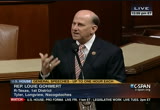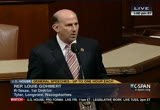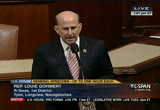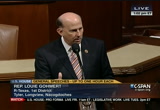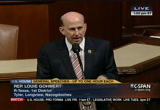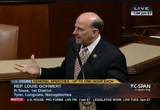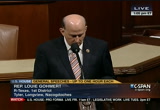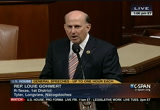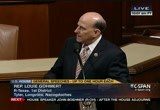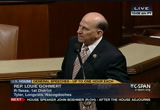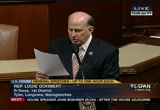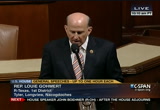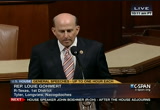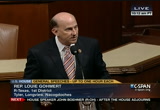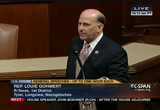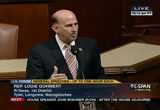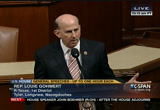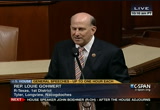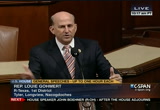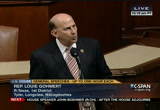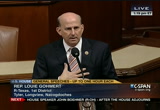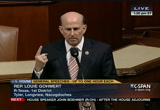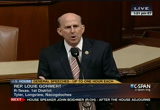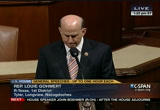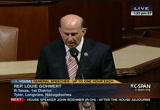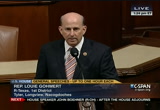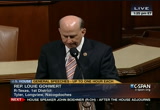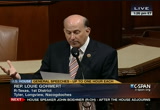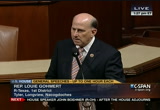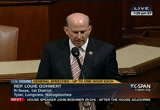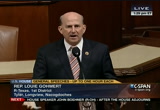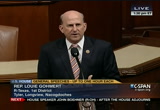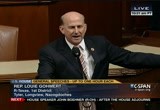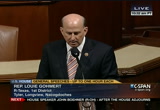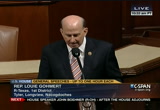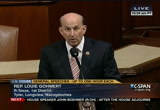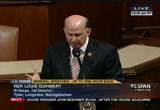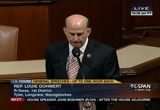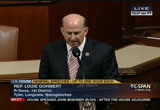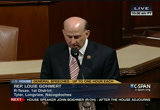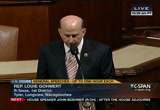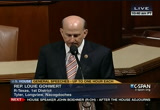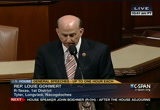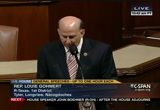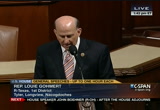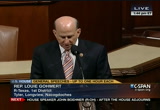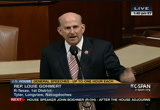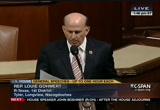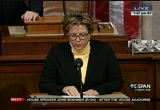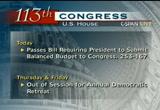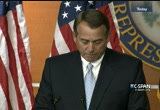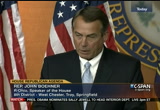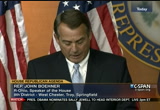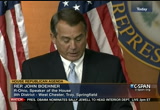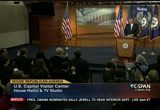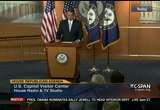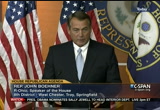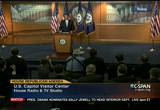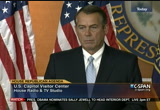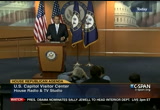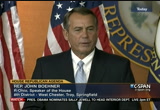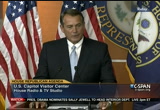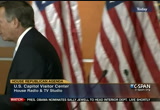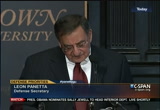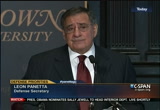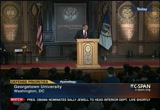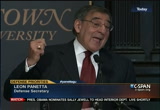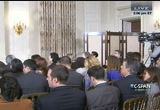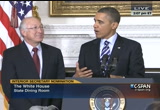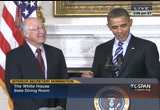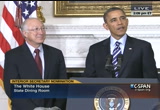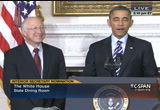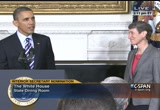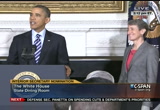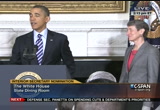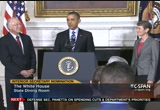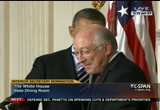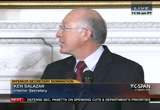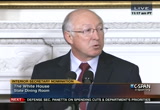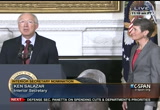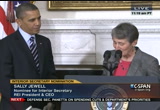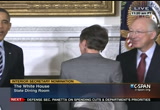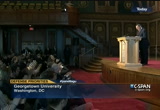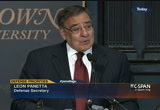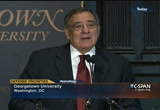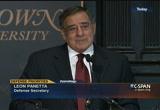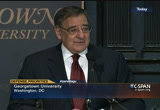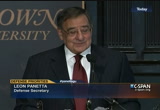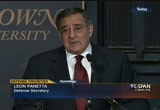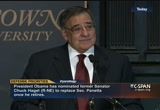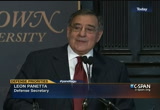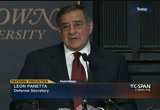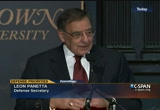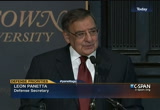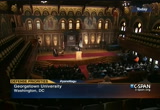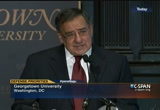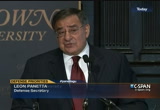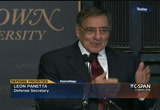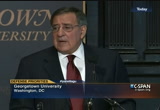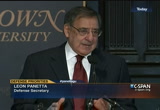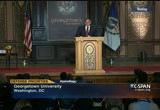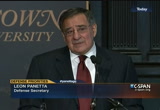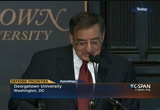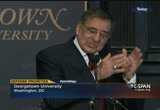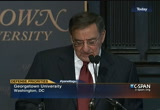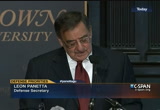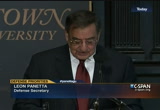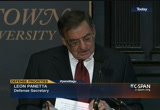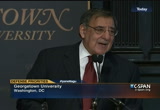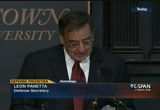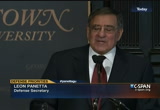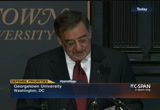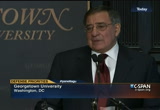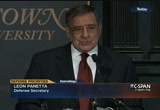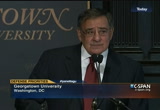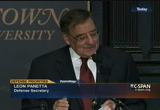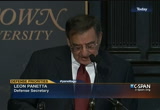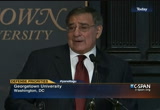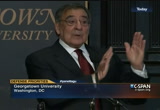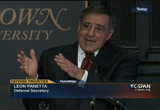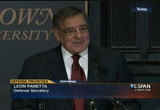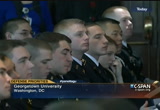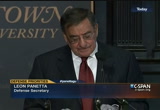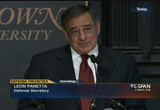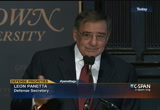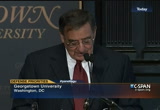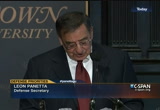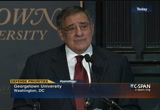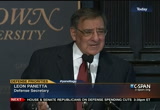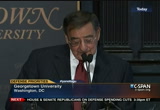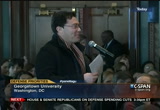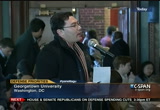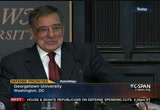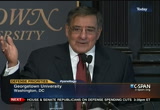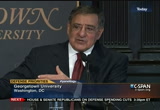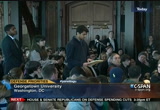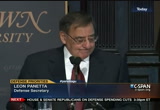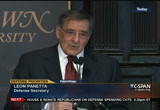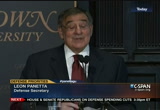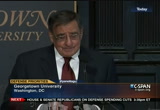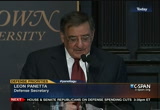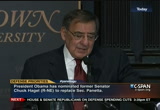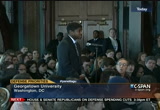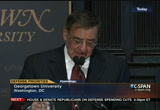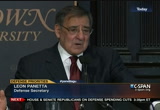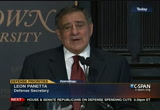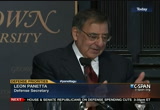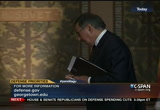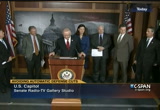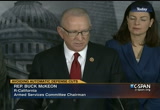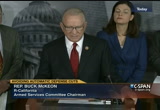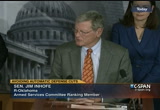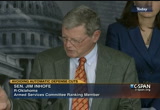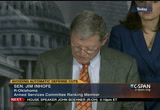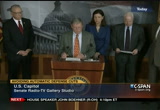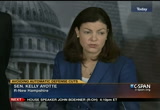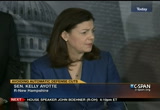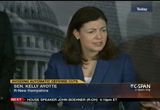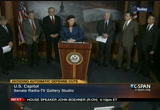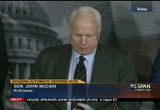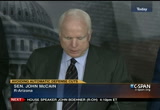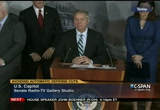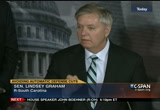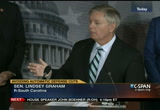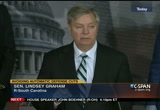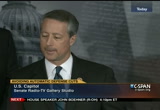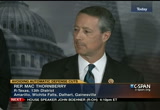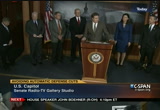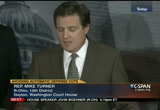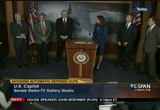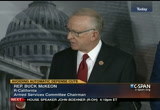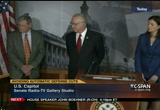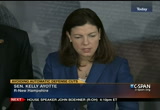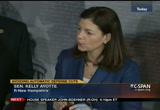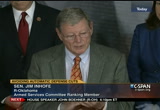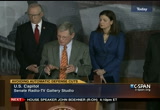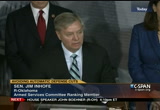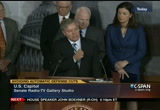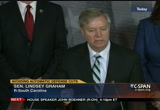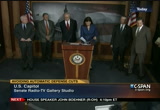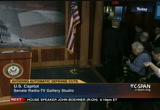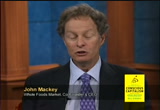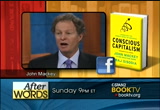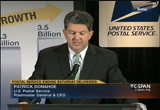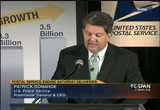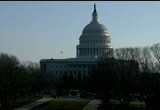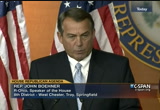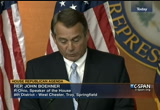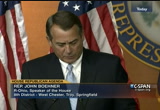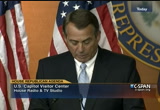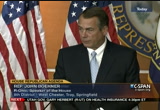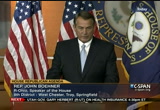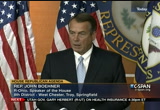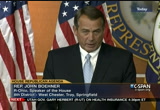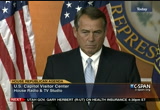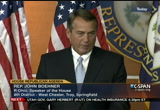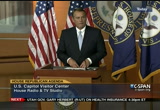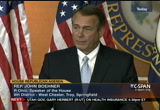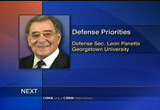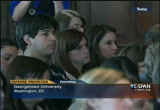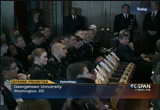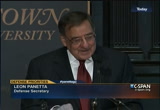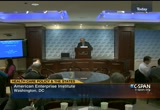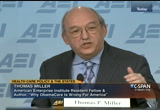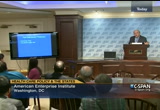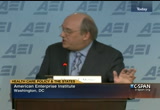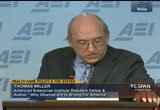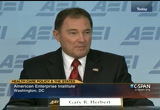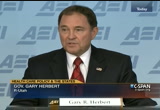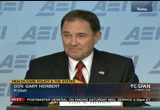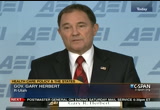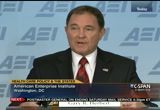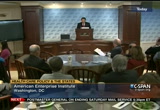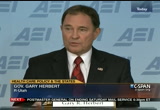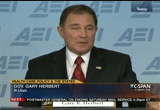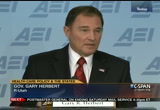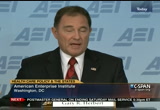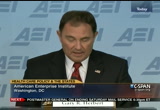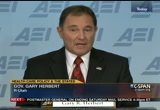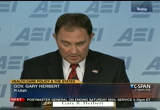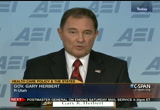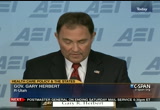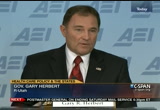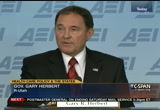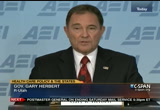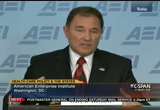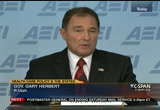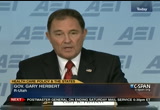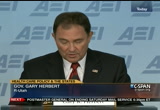tv Public Affairs CSPAN February 6, 2013 1:00pm-5:00pm EST
1:00 pm
possibility but it was worth the risk to give people the freedom of choice as they believed their creator had given all of us. to make decisions for good or bad and normally to have to live with the consequences -- consequences of those decisions. the global jihadist threat that secretary clinton pointed out does not have the belief that a democracy is a good idea. that a people electing representatives in a republican form of government is a good idea. they believed that we need some religious leader like the ayatollah khomeini or now in iran. they need a religious leader like that that tells us what we can do, that makes all his decisions under shari'a law. . all of those who met during the
1:01 pm
revolution, they believed in the power of prayer to god, and that's why they prayed during that time, but they wanted much to have the chance to worship as they chose. be they muslim, hindu. but especially judeo-christian beliefs where jews and christians had traditionally suffered so much persecution. they wanted the chance for people to worship as they please or not worship, but they knew to make that possible had he had to -- they had to pray to god. that's why we are observing once again tomorrow the national prayer breakfast where our president will speak, where we will have a fantastic testimony from one of the great leaders in our country who earlier in his life, when his life was going astray, dropped to his knees and prayed for help and got it.
1:02 pm
we'll hear about that tomorrow. but if we don't know the history of this country, if we don't know the dream of the founders, if we don't understand the constitution, then we lose it. and people need to understand when there is a global jee hasist threat, not of moderate muslims like our friends, the northern alliance, who fought and defeated the taliban on our behalf not the mean he of our enemy, but these are radical islamic jihadists who want a cal fate -- caliphate in which the united states is sub jew dated to a religious -- subjugated to a religious ruler and they are willing to use violence if necessary, although the muslim brotherhood now seems to indicate that here in america
1:03 pm
they have made so much progress in infiltrating and getting positions of power in our government, our state department, in our homeland security department, in our justice department, at the white house directly, and direct lines to the president, they have made so much progress in moving toward that goal of a caliphate here in the united states under shari'a law, not under the constitution, that they are thinking maybe violence is not the way forward in america to achieve their goal of making this a shari'a compliant caliphate. but the muslim brotherhood around the world believes many places violence is the way forward in those areas. but we've got to understand who we are facing and what they want to do. and secretary clinton, unfortunately, it's on her way out that she notes this instead of being able to spend the last
1:04 pm
four years with the clarity she had when she said that we face this danger of a global jihadist threat, it is a threat. she now acknowledges it on her way out. and the question now is, since secretary of state kerry will now be carrying that mantle, for heaven's sake we have got to have someone in intelligence directing intelligence who understands the threat against us. and will ensure that we are protected, and understands the global jihadist threat. the obama administration has focused almost entirely on al qaeda. believing people when they came in and said, look, the only people who can actually give you advice on dealing with these radical folks are islamic
1:05 pm
believers, he so you must get advice from us. form partnerships with us, let us give you advice, let us tell you how to deal with this threat. and they made great inroads in this administration in that approach. but the blindness of the larger jihadist threat, the enterprise that is being pursued by the muslim brotherhood abroad, has resulted in the practice of drone delivered assassinations of al qaeda figures with what many are questioning or arguing is due process without that. and this administration's repeated declaration that al qaeda is being defeated.
1:06 pm
they know not of what they speak. the idea that al qaeda is being defeated is helping recruit others who are radical jihadists, because they are able to point to a united states administration that is so blind and so uninformed of what really is going on that they think al qaeda's on the decline when radical jihad is on its way up. the drone technique of killing american citizens and killing radical jihadists is apparently felt by this administration to be a very advanced and practical
1:07 pm
approach. well, it does avoid putting americans at risk right now, with you those same people in this administration that talked about the danger of waterboarding because, yes, some acknowledge we got very critical information by using that, even though there was no threat to their health, no -- you had doctors there. there was no intention to do any harm, the intent was to perform a procedure that did not harm but would gather information. this administration ran against john mccain saying, even though john mccain agreed, yeah, we don't want to water board, we don't want to do anything that somebody might someday call torture, they complained, gee, this is allowing radicals to be recruited against the united states because of the unjust nature of doing a procedure
1:08 pm
that's not harmful to someone's health, to gather information to save american lives, which it did. here we are now with this administration that thought waterboarding helped jeeyaddists -- jihadists recruit more radicals using a process of having a high administration official think to himself or herself, i don't think this may be enough. blow them up. without giving adequate consideration to civilians who will be killed, to family members who will be upset, to the ability of our enemies to use that to recruit other radicals, many times over, to replace those that have been killed with a drone strike.
1:09 pm
this administration's systemic failure to understand what the muslim brotherhood calls, quote, civilization jihad, unquote, is putting this country in severe jeopardy. that's why i appreciate secretary clinton on her way out, unfortunately, pointing back to the danger of this global jihadist threat. according to the tsh-this is the name of the document, explanatory memorandum on the general strategic goal of the group, under quote, the mission of the muslim brotherhood is this, quote, a civilization jihadist process, a kind of
1:10 pm
grand jihad in eliminating and destroying the western civilization from within. sabotaging its miserable house with their, i.e., americans' hands and the hands of the believers so that it is eliminated and allah's region is made victorious over all other religions. unquote. the mission statement i just quoted translates into a comprehensive effort to penetrate to influence, otherwise subvert our american civil society. a form of government, a governing institutions. that explanatory memorandum i just quoted from was written on
1:11 pm
may 19, 1991, by a top muslim brotherhood operative, -- operative. now, though the justice department has established in federal court during the holy land foundation trials in dallas texas, that the groups identified by the muslim brotherhood in their memo are, quote, their organizations, end quote, a number of them and their successors have been treated by the obama administration as key interlock tors -- interlocutories in dealing with jihad. and believes in this administration, believe that these muslim brotherhood front organizations are legitimate representatives of the muslim
1:12 pm
-american community. they have enabled the muslim brotherhood to recruit and to show others, look, we are the ones that the white house trusts. we could call the white house. we can call and tell them we have -- there are three people who are giving a seminar at langley, c.i.a. headquarters, to law officers, hundreds of them, and we believe they will be teaching them things that are offensive to us. yeah, because they call them what they are. they read from their own documents. and these individuals who have spent their careers learning and teaching about the threat of what secretary clinton called the global jihadist threat, were
1:13 pm
stopped in august a year and a half ago by a call to the white house. that call also was instrumental in prompting this administration through the intelligence department, the justice department, all these departments, the f.b.i., into purging documents, purging words, purging things from our materials that someone who wants to destroy our way of life and take us up and make us a caliphate may be offended by. i can't go in to what has opinion purged because they decided to declare it a classified setting when michelle bachmann and i and for a while lynn westmoreland went through
1:14 pm
documents to see what had been purged. documents that we knew before we went there -- went in had supposedly been purged because someone who wants to destroy our way of life might be offended. i am offended, every american should be offended, every muslim should be offended that a governing administration would put the feelings of people who want to destroy us ahead of their oath to protect this nation and preserve the constitution. it doesn't mean anything to preserve the constitution. if you preserve the document but you do not preserve the enumerated powers and laws set out in that document. last june four of my colleagues and i wrote five different departments in this
1:15 pm
administration, and in those --each separate letter, each was different, we wrote to the inspector general of each department and we pointed out in each letter specific facts about that department that should give rise to an investigation as to the influence of people who have embraced the idea of civilization jihad and taking this country over and sub jew kating serb serb subjugating us to shari'a law and this leader who can tell us how to avoid more depravity. there was such an uproar, even by some republicans, by a few of them anyway, but some in the media went ballistic and instead of doing their own investigation, they start
1:16 pm
blaming the messenger. . she said, oh, by the way, there is a global jihadist threat. that's what we've been trying to tell people. for a couple of years at least. there is a global jihadist threat. thank you, secretary clinton. you're right. now, for this administration to bring people in to top positions who do not understand the threat to this country and think that ignoring due process of our constitution and killing american citizens with drone bombs is somehow preserving the constitution, it requires another look. it requires oversight. there may be circumstances where that's what needs to be
1:17 pm
done. but i do find it interesting that this administration and certain leaders here on the hill had no problem with alwith a licky leading -- with ah-waliki leading prayers here on capitol hill, prayers that were videotaped, he led prayers on capitol hill and then he goes to yemen and this administration things that we better kill him with a drone without due process, what were they afraid of, maybe he'd come back and lead prayers on capitol hill or maybe he would be captured and talk about who all he led prayers with on capitol hill. what was the need for taking this man out? we're told he had blood on his hands and so it does seem.
1:18 pm
but there seems to be a problem when leaders of this country will say you cannot water board to get information even though it's not a threat to the health of the individual. scares them. but we will take an american citizen out who, not so long before, was leading prayers of muslim staff members here at this capitol on capitol hill. it would be a grave mistake for our senate to confirm john brennan as the chief architect that he's been for the failure to understand and comprehend the global jihadist threat that secretary clinton has noted going out.
1:19 pm
there was an article today about -- dated february 6, jim geherty, and i'm quoting from the article. let me throw you a curveball by quoting adam of mother jones reacting to the administration's release of its legal justification to kill americans believed to be involved with terror without a trial by drone. and let me pair theycally note here -- parenthetically note here, i am not one who comes to the table without understanding about trials, about evidence, about due process, about constitutional rights and about a death sentence.
1:20 pm
i've signed death sentences. it's a heavy weighting matter. as someone who's believed in capital punishment in the right circumstances, it still is a challenging moment when you watch your hand sign an order to have someone put to death. done it twice, and in both cases the evidence was overwhelming beyond a reasonable doubt and the evidence was also overwhelming beyond a reasonable doubt that those two individuals were -- murdered an individual or more, knew what they were doing when they murdered one or more
1:21 pm
individuals, were complicit and actually either murdered or participated in the murder and that there was no evidence. the question put to the jury, is there any evidence that mitigates upon the imposition of the death penalty, as the supreme court has found? any evidence? is there any evidence that mitigates against the death penalty? that's one of the three questions. that's the standard. and that's what juries in states that allow capital punishment have had to wrestle with. but i'd like to know who is considering those weighty issues in this administration? so we go back to the article. he quotes from mother jones. the obama administration claims
1:22 pm
that the secret judgment of a single, quote, well informed, high-level administration official, unquote, meets the demands of due process and is sufficient justification to kill an american citizen suspected of working with terrorists. that procedure is entirely secret. thus, it's impossible to know which rules the administration has established to protect due process and to determine how closely those rules are followed. the government needs the approval of a judge to detain a suspected terrorist. to kill one, however, it need only give itself permission. of course, the hypocrisy of most liberals don't get us off the hook on the need to have a coherent view on this, says mr.
1:23 pm
garrity. of course, conservatives, big question now. if this were president romney, would we be shrugging, complaining, screaming? i think concerned. at least you'd want another set of eyes. the house and senate intelligence committees or some independent judges taking a look at the presidential kill list, right? at least for the american citizens. r. -- charles c.w. cook said, i am appalled by any president processing the unilateral power to kill american citizens extra judicially. unquote. senator ron wyden, senate democrat said, quote, every american has a right to know when their government believes that it is allowed to kill them, unquote. garrity finishes his article by
1:24 pm
saying, that doesn't seem like too much to ask. the article in mother jones is worth considering. it's dated tuesday, february 5. posted by adam. it takes a good look at this issue. so what is the result of this administration's deciding secretly some bureaucrat decides, yeah, we got enough, we'll kill this man, yeah shes we got enough, we'll kill this american citizen? well, how is that working out? well, there's an article
1:25 pm
published january 31, 2013, by kathryn harridge. she has a create book out on radical islam. this article she entitled "al qaeda affiliate in africa looking to strike more western targets, intelligence officials say." she says in her article, quoting secretary clinton, quote, yes, we now face a spreading jihadist threat. we have driven a lot of the al qaeda operatives out of afghanistan, pakistan, killed a lot of them including, of course, bin laden. but we have to recognize this is a global movement. it's not -- that's her quote. my comment, it's not a movement
1:26 pm
that is simply attacking overseas. in some foreign country. anyway, good article by catherine herridge. she understands the threat. but let me read a quote directly from white house counterterrorism advisor and nominee for director of the c.i.a., mr. john brennan. he said, quote, hezbollah started out as purely a terrorist organization back in the early 1980's and has evolved significantly over time . and now it has members of parliament, in the cabinet, lawyers, doctors, others who are part of the hezbollah organization and so quite frankly i'm pleased to see that a lot of hezbollah individuals
1:27 pm
are in fact renouncing that type of terrorism and violence and are trying to participate in the political process in lebanon in a very legitimate fashion. they have not sworn off violence in lebanon. they have not sworn off violence in egypt, in syria, as we well know, in libya, albania, tuesday nearbyia -- tunesia, even in african nations further south. i said before, expressed my concern that this administration by helping them, encouraging them to overthrow this nation's ally, president
1:28 pm
mubarak, express concerns before it was done about giving military assistance to people that we knew, including al qaeda, to joe throw a man who had blood on his hands but since 2003 had been this nation's and this administration's ally, gaddafi. and they participated in taking him out, gave military aid to do so to protect the al qaeda and other revolutionaries and setting up a government, a situation that naturally was going to get americans killed and which happened. so i applaud secretary clinton for noting the global jihadist threat on her way out, but i come back to her question that will ring in people's ears for
1:29 pm
years to come. when senators are trying to get to the heart of the matter, what happened at benghazi. please, just tell us what happened. we are not going to prosecute anybody here at the senate. we just need to know what happened. her questions, her words will ring, what difference does it make? what difference does it make? americans got killed. i was inquiring, does anybody know was a fifth person, had they died of their wounds at benghazi? what's going on? what is happening to those people who were wounded who can tell us what really happened? what difference does it make? so we can avoid americans being killed like that in the future. if we had an adequate
1:30 pm
investigation about security at our embassy back when susan rice was involved back in the 1990's, did they ask for extra security, did you deny them that security, did we have enough security, what happened to allow our embassy to be bombed and americans to be killed? what difference does it make? because if we had known in the 1990's what went wrong, maybe we could have avoided chris stevens, our seals, those four americans that we know of being killed. what difference does it make? it makes a difference to their families if they're alive today or they're dead because we were not properly secured. what difference does it make? it makes a difference to future familiar lows who live -- lose loved ones in the service of their country because people stonewalled and would not give us the information as to what went wrong, what happened. just tell us. .
1:31 pm
we are supposed to trust the administration not only with a bureaucratic decision by one person that he thinks he's got enough information to go kill an american citizen without a trial , now we have to say, oh, well, we will trust them to make sure nobody gets killed again, but it's already happened. and then by the stonewalling we don't know enough about where the weapons came from. we don't know enough about what went wrong to know how those weapons that we may have provided in a country where we provided the ref lutionary help now has resulted in americans and others being killed in algeria. what dimps does it make? i'm -- difference does it make? i'm sure the people who died in algeria would like to have their family members back. that makes a difference.
1:32 pm
what difference does it make? it doesn't make any difference if you don't care who lives or dies. but if you want to protect americans in the service of their country, it makes a real difference. and it's our duty to try to protect them. "the new york times" has an article by gregory johnson back in november, entitled the wrong man for the c.i.a. he said with resignation petraeus, president obama has a chance to appoint a new c.i.a. director. unfortunately one of the leading candidates for the job is john o'brennan who is largely responsible for america's current flawed counterterrorism strategy. which relies too heavily on grown strikes that frequently kills civilians and provide al qaeda with countless new recruits. rather than keeping us safe, this strategy is putting the
1:33 pm
united states at greater risk. for all of the obama administration's foreign policy successes, from ending the war in iraq to killing osama bin laden, the most enduring policy legacy of the past four years may well turn out to be an approach to counterterrorism that american officials call the yemen model. a mixture of drone strikes and special forces raids targeting al qaeda leaders. mr. brennan is the president's chief counterterrorism advisor and architect of this model. in a recent speech he claimed there was, quote, little evidence that these actions are generating widespread anti-american sentiment or recruits for aqap, unquote, referring to al qaeda in the arabian peninsula. perhaps the initial donea bye instead of aqap, this is me talking, not the article,
1:34 pm
instead of the initials, acronyms that the administration s, government likes to do, maybe it ought to be mbch, the muslim brotherhood on capitol hill. where al lackey that this administration killed with a drone strike led prayers. back to the article, mr. brennan's assertion was either shockingly naive or deliberately misleading. testimonies from al qaeda fighters and interviews i and local journalists have conducted across yemen attest to the centrality and explaining the rapid growth there. that needs to be noted. people that have actually done an objective analysis have found al qaeda is not diminished.
1:35 pm
radicals are growing to the point that secretary clinton would note the jihadist threat as she leaves. in the article says the united states is killing women, children, members of key tribes, quote, each time they kill a tribesman, they create more fighters for al qaeda, unquote. one many explained to me over tea in the capital last month. another told cnn after a failed strike, quote, i would not be surprised if 100 tribesmen joined al qaeda as a result of the latest drone mistake, unquote. rather than promote the author of a failing strategy, we need a c.i.a. director who will halt the agency's creeping militarization and restore it to what it does best. i would say what it did best at one time. collecting human intelligence. it's an intelligence agency, not a lightweight version of joint
1:36 pm
special operations command. and until america wins the intelligence war, missiles will continue to hit the wrong targets, kill too many civilians, and drive young men into waiting arms of our enemies. without accurate on the ground intelligence, our policies will fail, george w. bush launched two major ground invasions, and mr. obama has tried several smaller wars, neither strategy has worked. in yemen, which has been the laboratory for mr. obama's shadow wars, aqap has more than tripled in size after three years of drone strikes. when the united states started bombing yemen in 2009, aqap had just 200 to 300 fighters. today the state department estimates it has a few thousand. since 2009, the group has attempted to attack america on three occasions coming closest on december 25, 2009, when a would-be suicide bomber narrowly
1:37 pm
failed to bring down an airliner over detroit. when it tries again, and it will, the organization will be available to draw on much deeper ranks. not surprisingly, american officials reject the claim that current policy is exacerbating the problem. in june, 2011, mr. grenian -- brennan declared, quote, there hasn't been a single collateral debt because of the exceptional prevision of the capabilities we have been able to develop, unquote. this came almost exactly a year after a botched drone attack in yemen killed a deputy governor and four of his body guards instead of the intended target. mr. brennan's guidance, the united states has also adopt add controversial method for determining how many civilians it has killed. counting all military-age males in a strike zone as combatants. this means that a 16-year-old american citizen killed by a
1:38 pm
drone in october was classified as a militant despite evidence that he he was simply a shy teenager whose father happened to be anwr al awacky who had been killed by american missiles two weeks earlier. the strikes mr. brennan asked the president to approve frequently lead to civilian casualties. indeed. the first strike mr. obama ordered on yemen december, 2009, destroyed a village that was mistaken for a terrorist training camp. american missiles killed more than 50 people, including 35 women and children, watching the strike live on a grainy feed, the military calls kill tv, jay johnson, a pentagon stop lawyer admitted, quote, if i were catholic i'd have to go to confession, unquote. mr. petraeus' departure presents mr. obama with an opportunity to halt the c.i.a.'s drift toward becoming a paramilitary organization and put it back on
1:39 pm
course. for all the technological advances america's made in the decade of fighting al qaeda, it still needs all the old tricks it learned in the day before spy satellites and droughns drones. more and better human intelligence in sources on the ground will result in more accurate targeting. that would be a yemen model that actually worked and a lasting and more effective counterterrorism legacy for mr. obama's second term. gregory johnson from "the new york times." another good article by patrick pool on june 6 of 2012. obama's assassination czar, a relatively unnoticed article, this is from the article, quoting, by associated press reporter kimberly dozer two weeks ago outlining new obama
1:40 pm
administration policy changes which consolidated power for authorizing drone attacks and assassinations under political appointees within the white house. the article identified -- identifies white house counterterrorism chief, john brennan, as the official assuming the role of obama's de facto assassination czar. raising concerns even within the obama administration that the white house is increasingly turning into a, quote, pseudo military headquarters, unquote, under the direction of just a few senior he obama administration officials. adding to these concerns are serious questions about brennan's qualifications for this role. even before the 2008 election eyebrows were raised over his role in the campaign, an employee of the analysis corporation, which brennan was c.e.o., had improperly accessed passport information for hillary
1:41 pm
clinton, obama's democratic primary challenger at the time. and g.o.p. john -- nominee john mccain. at the time brennan was a top advisor to the obama campaign and prenian's employee was not fired -- brennan's employee was not fired. one of the key witnesses in the case was found murdered in his car outside his church while the investigation was still ongoing. brennan was involved in administration related to the release of convicted libyan pan am flight 103 bomber from a scottish jail in august, 2009. at the time of the release when he returned to libya to a national heroes welcome, brennan described the release as, quote, unfortunate, inprote, and wrong, unquote, and called for his reimprisonment. however obama administration documents obtained by the sunday
1:42 pm
times revealed that the white house had secretly informed scottish authorities that they found compassionate release more palatable than the reimprisonment of him in libya. brennan also came under fire after would-be underwear bomber nearly brought down a u.s.-bound northwest airlines flight on christmas day, 2009. british intelligence authorities had notified their u.s. counterparts of a, quote, meeting with al qaeda cleric in yemen. and farooq's father had warned of his son's increasing extremism to c.i.a. officials at the u.s. embassy in nigeria. however, farooq was never added
1:43 pm
to the u.s. no-fly list, nor was his u.s. visa revoked. but for, as i understand it, him sweating too much around his poss tear year -- posterior that helped defuse the bomb and the work of heroic passengers to stop him once he tried, the crew was -- the passengers were safe, but it was certainly no thanks to the obama administration or mr. brennan. back to the article. patrick says, following this stunning and nearly fatal intelligence failure, which prompted members of both the house and senate intelligence oversight committees to call for his resignation, brennan lashed out at the obama administration's critics. in "usa today" editorial, he claimed that the quote, politically motivated criticism and unfounded fear mongering
1:44 pm
only served the goals of al qaeda. unquote. let me insert here, if he he thinks mr. brennan thinks that questioning failures of the obama administration is contributing to al qaeda, what must bombing innocent people with drones be doing for al qaeda? back to the article, says brennan also defended treating omar farooq as a criminal by having his rights read to him upon arrest and trying him in civilian court rather than transferring the would-be bomber to military custody as an enemy combatant. just days later brennan gave a speech to islamic law students in new york university where he was introduced by the president of the islamic society of north
1:45 pm
america, at that time, who had been involved with the obama inaugural prayer service had come under fire then for organizations long-standing terrorist support. . the administration eventually backed away from. he claimed the terrorists were the real victims of political, economic and social forces. mr. speaker, it's important people understand john brennan claimed that the terrorists killing americans, over 3,000 on 9/11, were the real victims of a political, economic and social force.
1:46 pm
brennan said islamic terrorists are not jihadists, referenced al qaeda in jerusalem and said 20% of guantanamo detainees returning to terrorist activities were not that bad when comparing ordinary criminal recidivism. the thousands of people that were likely killed by the 20% of our detainees being returned to terrorist activities, probably would not consider mr. brennan's assessment as not that bad. they wouldn't consider all that accurate. patrick wright has a great article. he has another one, january 7, 2013, entitled "revisiting jihad: john brennan." another by my friend, andrew mccarthy, oppose brennan for c.i.a. director. i'd ask unanimous consent to include these articles in the
1:47 pm
record. the speaker pro tempore: without objection. mr. gohmert: it is time we took a real objective look at people who say their goal is civilization's jihad and the elimination of our freedom to choose as we please and to choose our public servants. and, mr. speaker, with that i yield back. the speaker pro tempore: the gentleman yields back. the chair lays before the house a communication. the clerk: the honorable the speaker, house of representatives, sir, pursuant to section 643-c of the american taxpayer relief act, public law 112-240, i am pleased to appoint the following individuals to the commission on long-term care. bruce allen churnoff of los angeles, california.
1:48 pm
george of washington, d.c. thank you for your attention to these appointments. signed sincerely, nancy pelosi. the speaker pro tempore: for what purpose does the gentleman from texas rise? mr. gohmert: mr. speaker, at this time i ask that the house adjourns. the speaker pro tempore: the question is on the motion to adjourn. those in favor say aye. those opposed, no. the ayes have it. the motion is adopted. accordingly, the house stands adjourned until 11:00 a.m. on friday, february 8, 2013.
1:49 pm
>> speaker boehner earlier today said he would oppose a delay in automatic budget cuts, the so-called sequester, without spending cuts and reforms. his briefing with reporters just under 15 minutes. >> the number one priority for the american people is creating jobs and getting our spending under control. even though we are a minority party here in washington, republicans have made every effort to address the concerns of the american people. less than two years ago president obama said, ultimately all this rising debt will cost us jobs and damage our economy.
1:50 pm
unfortunately the president and senate democrats have done almost nothing to address our long-term debt problems. yesterday the president warned of grave economic consequences but he didn't announce any specific plans for how he would address it. he didn't bother to actually outline how he would replace the sequester that he suggested and insisted upon in august of 2011. and tell us when we might see his budget, which is again late and how he would address the sequester in his budget. although this underscores the importance of republican efforts to push measures like no budget, no pay, and to require a plan act to force the president and senate democrats to take our spending problem seriously. listen, washington desperately needs adult leadership. that's why republicans have twice voted to replace the
1:51 pm
president's sequester with sken cuts and reforms that protect our national defense. that's why republicans have passed budgets in each of the last two years and will pass another one here in the coming weeks. we believe there is a better way to lower the devers, but americans do not -- to lower the deficit, but americans do not support sacrificing real spenged cuts for more tax hikes. the president's sequester should be replaced with spending cuts and reforms that put us on a path to balance a budget over the next 10 years. the american people believe that the tax question has been settled. they know the president called for a balanced approach to the debt. combination of revenues and spending cuts, and they know he's gotten his revenue. the american people do not believe the president will use further tax revenues to lower the debt.
1:52 pm
and haven't seen this president attempt to spend his way into prosperity over the last four years, they know he'll spend it. the president doesn't believe we have a spending problem. he general winly believes the government -- genuinely believes the government spending causes economic growth. if that were true, the economy today would be thriving. it isn't thriving. the unemployment rate is still nearly 8% and rising. small businesses like the one i ran are struggling. middle class families, those lucky enough to have a job, are living paycheck to paycheck. and president obama just insisted on raising their taxes. americans know that another tax hike isn't going to help them. what they want is for the spending under control so the economy can grow and they have opportunities again. democrats say we should replace the president's sequester with revenue increases or delay it. republicans say we should
1:53 pm
replace with responsible reforms that will help put us on a path to balance the budget in 10 years. republicans may not be the majority party here in washington, but the american people would a -- would agree with us on this and we are going to continue to stand with the american people. >> there's also a number of initiatives, immigration that the senate is moving ahead here. do you think it's going to be a problem for democrats to get behind some of these proposals? you have had issues over certain bills passing through your side. are these same types of issues because tough votes will be problems for harry reid and the senate? these are issues that are going to come over here at some point. don't you -- hold up the process if he's having trouble on these tough issues? >> the legislative process was
1:54 pm
designed to be inefficient and difficult. so that if congress were able to move a bill through both houses and could agree upon a bill, it would actually become a law. so at the start of every session there are always a number of issues that carry over from the prior session. and frankly there's a lot of scar tissue that carries over with a lot of these bills. it's up to congress to figure out where the common ground is and how to deal with it. let me make clear i don't like the sequester. i think it's taking a meat ax to our government. meat ax to many programs and will weaken our national defense. that's why i fought to not have the sequester in the first place. but the president didn't want to have to deal with the debt limit again before his re-election.
1:55 pm
it was the president and senate democrats who committed to working with us to get an outcome out of the supercommittee, but the supercommittee couldn't get an outcome, the sequester went into effect. i believe that there are -- we know what the menu of options are. cut reforms that we can put in place to put us on a sound fiscal path. help investors and businesspeople in america understand where it is the government's going, be more responsible about our debt, and those cuts and reforms ought to be put in place. we have passed some bills twice to replace the sequester. it's time for the president and senate democrats to do their job. >> wanted to ask you about the postal services cut back of delivery on saturday. said last year passed bipartisan
1:56 pm
reform, postal reform, and the house has not acted yet. what do you see happening in this congress? >> i know that chairman issa is interested in moving a postal reform bill. i know that they are having bipartisan conversations about how to do this, and i would hope that the congress would act in a timely fashion. >> following up, why hasn't congress acted in the postal service -- the congress could have done something given that the senate had passed something, why hasn't the house acted? >> i think trying to act in this postal area is pretty difficult, but i understand where the postal commission is coming from. they are in charge with running the post office. but yet the congress in its wisdom has tied their hands every which way in order for them to actually run the post
1:57 pm
office in a revenue neutral way. so congress needs to act. there is no question about that. and i hope we'll act soon. >> mr. speaker, what did you make of the majority leader cantor's speech at the american enterprise institute yesterday and the themes he outlined about the republican future? >> i thought eric did a very nice job yesterday. pointing out while there is an awful lot of discussion about the deficit and debt in our long-term fiscal situation, there are other issues the republicans care about that are consistent with our principles. but he did a very good job. >> mr. speaker, now that we have seen unclassified memo on the decision tree the white house uses in collecting terror targets, your constitutional -- are you comfortable with any president of the united states unilaterally choosing in certain cases to kill american citizens
1:58 pm
in an extra judicial fashion if it's judged -- in this case not necessarily in imminent threat but a threat, are you comfortable with a president killing americans in that way? >> chairman rogers put out a statement yesterday and i agree with his statement. >> you said president obama, quote, got his revenues, has his revenues. but during december you offered a trillion in revenue. the fiscal cliff deal got $600 billion. if obama took your offer, your last offer for $1 trillion, could that pass the house? >> who knows what would happen today, but the fact is is that the trillion dollars in spending cuts and reforms that were on the table, the president never
1:59 pm
agreed to. and the trillion i put on the table wasn't enough for the president. listen, the republicans have acted. it's time for senate democrats and the president to act as well. >> with regards to mr. cantor, he basically came out in favor something along the lines of dream act, pathway to citizenship for those brought here by their parents as minors. do you agree with mr. cantor on that? >> there are a lot of members with a lot of good ideas, and there's a lot of bipartisan work going on here in the house and a bipartisan work going on in the senate. and i want to do everything i can to foster this continuing conversation in a bipartisan fashion to deal with what is a very difficult issue in our country. but it's certainly worthy of consideration. >> you talked about how you don't like the sequester and this morning secretary panetta said it would cause -- you know
2:00 pm
the senate will take up the bill, why aren't there any bipartisan talks to get rid of the sequester? why is it up to the senate democrats if you don't like it? why not -- >> we have acted. if they want to act, and pass a bill, we can agree to it or maybe we can go to conference. . but i am more than willing to work with my senate colleagues on a plan that will have cuts and reforms that will put us on a path to balance a budget in 10 years. >> give us some kind of example on some option that you would do? >> i'm taking a deep breath. now, we got through to the end of the year and we had this issue of taxes. it wasn't like the congress and the president didn't know for
2:01 pm
two years that all the tax rates were going to go up on the american people on january 1. the house passed a bill in 2011, passed another bill in 2012 that would extend all of the current tax rates. and yet what do we do? we get down to january 1 before the congress acts. in that bill they decided to move the sequester out a couple of months, and now the president is talking about moving the sequester out a couple months more. we got the debt limit out of the way so that we weren't jeopardizing the full faith and credit of the united states government. at some point washington has to deal with its spending problem. now, i've watched them kick this can down the road for 22 years i've been here. i've had enough of it. it's time to act. [captioning performed by national captioning institute] [captions copyright national cable satellite corp. 2013]
2:02 pm
>> in just a couple minutes here on c-span, we are going to take you live to the white house. president obama is expected to announce that r.e.i. c.e.o. sally jewell is his next choice to be the interior secretary. he'll announce the nomination from the east room of the white house. we'll take you live there live once it does start here on screep. one outgoing cabinet member, defense secretary leon panetta speaking later today in washington. talked about the challenges facing the defense department in advance of the sequestration budget cuts. here's what he had to say. >> we consulted with the president. we consulted with the national security team at the white house as we went through this. and everybody endorsed the policy and strategy that we came up with. it has five key elements. the first is that we know we're going to be smaller and leaner. coming out of these wars, we are going to be smaller and leaner as a force.
2:03 pm
but we can be as a force agile, flexible, quick low deemployable and at the cutting edge of -- deployable and at the cutting edge of technology. yet, we can be smaller. but agility, flexibility, the ability to move fast when crisis happens, that's what can distinguish the united states' defense policy. secondly, it was important for us to project power into the pacific and in the middle east. those are the key areas where we got some serious problems -- north korea, iran. we need to have a power presence in those areas. because that's where the greatest potential for conflict lies. third, we need to maintain a presence elsewhere in the world , and so what was developed was
2:04 pm
the idea, innovative idea of rotational deemployments where we would send our -- deployments where we would send our countries into latin america, africa, europe, other places to train, to exercise, to work with that country to develop their capabilities, to develop new partnerships, new alliances so that they could become part of this security force for the future. fourthly, we had to maintain the capability to defeat more than one enemy at a time. if we're in a war in north korea and at the same time the straits of hormuz is clessed, we have to respond to both of those conflicts, to be able to confront the enemy and ultimately defeat an enemy on both fronts and we have that capability, maintaining that capability was important. and lastly, this can't just be
2:05 pm
about cutting. it has to be about investing. every time we've gone through budgets -- i used to do this in the clinton administration. yes, you cut. you find savings. but at the same time you establish priorities. budgets are not just numbers. budgets are about priorities. and so what are our priorities that we have to invest in for the future? so we made the decision that we have to invest in things like cyber, in unmanned systems and special operations, in space, all of which will help us be on the cutting edge of the future. invest in new technologies, invest in the ability to mobilize quickly, invest in the ability to maintain as i said that decisive technological edge in the future and maintain our industrial base in this country, our defense industrial base, the last damn thing we
2:06 pm
need if we face a crisis is to somehow contract out that responsibility to another country. so we have to maintain the core industrial base that we need, the skills that are essential to our ability to maintain a strong national defense. so that strategy established priorities. it reshaped the force to deal with the challenges not just today but of tomorrow. >> outgoing defense secretary leon panetta from earlier today at georgetown university and we'll show you all of his comments in just a bit after we hear from president obama who here in the east room of the white house is expected to in just a couple of minutes name sally jewell as his next interior secretary. sally jewell is the c.e.o. of recreational equipment, incorporated, better known as
2:07 pm
r.e.i. and now live to the president here on c-span. >> please have a seat. everybody is so formal. well, good afternoon, everybody. the department of the interior is actually the department of america. other members of my cabinet may not entirely agree with that statement but you can see where he's coming from. secretary of the interior is in charge of overseeing 500 million acres of public land, including places like yellowstone and the grand canyon and protecting our natural heritage for our children children and our grandchildren and their children to come. but the job also requires keeping an eye on america's future and making smart decisions about how we create jobs and help businesses grow and put ourselves on a path
2:08 pm
towards energy independence and that's not always an easy balancing act. but with enthusiasm and skill and dedication, that's exactly what ken salazar's done for the last four years. we were just reminiscing a little bit. i've known ken since we were both running for the senate together and became the only two incoming democrats in our senate class. pete remembers this. it was a lonely time. we actually lived in the same building when we first arrived in washington. and, ken, you'll recall, it was a little discouraging because basically everybody else that lived there was 20 or 25. so we were the two jerry at ricks in this building. but i came to appreciate quickly, not just his --
2:09 pm
geriatrics in this building. but i came to appreciate quickly, not just him. not only did i come to appreciate his jump shot -- he's surprisingly quick on the court -- but also his patriotism and his belief that we have a responsibility to care for the land with which we've been blessed. it's not surprising that ken feels this way. his ancestors were living here before the mayflower set sail. as he explains it and relevant as we are working to get immigration reform passed. his family did not cross the border. the border crossed them. and that's why when i needed someone to lead the interior i didn't need to look far. since then ken has cracked down on waste. he's improved the management of the department to make it work better for the american people. he's ushered in a new era of conservation for our land, our water and our wildlife. he's established seven new national parks, 10 new national
2:10 pm
wildlife refuges. he's opened more public land and water for safe and responsible energy production -- not just gas and oil but wind and solar -- creating thousands of new jobs and nearly doubling our use of renewable energy in this country. he's helped to forge what's probably the strongest working relationship with tribal leaders that the federal government has seen in modern times. and when the unexpected has happened, like the gulf oil spill or hurricane sandy, he's been on the ground making sure that people get help right away and we deal with these challenges as professionally as possible. so i really like ken salazar, if you haven't gotten the point. ken is now ready to head back to colorado and spend more time with hope and his family and so
2:11 pm
in addition to just saying thank you, ken, for the extraordinary work that you've done, ken is also going to have the opportunity to introduce his successor. and i am extraordinarily proud today to nominate another strong and capable leader to take the reins at interior and that is ms. sally jewell. in high school sally's aptitude test showed she had a knack for mechanical reasonable and spatial -- we check. we do thorough vetting before nominations. of course her recommended professions after she took these professions were to be a nurse or a teacher. just like all the other girls in her class. and it wasn't until she was an undergraduate at the university of washington she realized her boyfriend's home work was more
2:12 pm
interesting than hers and she decided to become an engineer. sally went on to work in the oil fields of oklahoma and california. later she brought her experience in the energy sector in banking where she spent 19 years determining what companies succeed and fail. and most recently as the c.e.o. of r.e.i., a position she's held for the last eight years. sally has helped turn a stalling outdoor retailer into one of america's most successful and environmentally conscious companies. last year r.e.i. donated almost $4 million to protect trails and parks, and 20% of electricity used in their stores comes from renewable sources. even as sally spent the majority of her career outside of washington, where i might add the majority of our interior is located, she is an expert on the energy and climate issues that are going to shape our future. she's committed to building our nation-to-nation relationship
2:13 pm
with indian country. she knows the link between conservation and good jobs. she knows that there's no contradiction between being good stewards of the land and our economic progress. that in fact those two things need to go hand in hand. she's shown a company with more than $1 billion in sales can do the right thing for our planet. sally's broad expertise and set of values i know are going to serve her well as she takes on these new challenges. she's got a wonderful and supportive family who i understand enjoy the great outdoors just like she does. so they got a vested interest in making sure that the department of the interior is doing the right thing. when sally's confirmed, i'm willing to bet that she will be the first secretary of the interior who frequently hikes mailbox peak in her native washington state and who once spent a month climbing mountains in antarctica which i don't think of something i would do because it seems like
2:14 pm
it would be cold and i was born in hawaii. [laughter] so for sally the toughest part of this job will probably be sitting behind a desk. i suspect she'll want to get out of the office quite a bit. but, again, i want to thank ken salazar and the entire salazar family for their extraordinary service, their extraordinary friendship. the department of the interior is stronger. this country is stronger. our natural resources are in a better place because of his extraordinary service. i could not be more thrilled with the work that sally, i know, is going to do in following that path that ken has carved. i expect the senate to confirm her as quickly as possible. and with that i'd like to invite both of them to say a few words, starting with my dear friend, ken salazar. [applause]
2:15 pm
>> thank you, mr. president. is it the same one i have? >> no, that's sally's. just didn't want to get them mixed up. >> let me just first of all say to president obama that i am humbled and honored beyond imagination to have been a part of the president obama dream team for the united states of america. his presidency is historic. his team in the white house is historic and the team at the department of interior are historic. and for that i will ever be eternally grateful to you, my wonderful friend, mr. president. >> thank you. [applause]
2:16 pm
>> so with your leadership and support and this wonderful team that we have here, we have in fact changed the way that the department of interior does business. we have seized the opportunity together with our other closing on the cabinet and under the president's leadership and your stellar staff here at the white house to put the nation on a path towards energy independence. today, the largest solar projects in the history of the world are coming up out of the deserts of the public lands of the united states and our foreign oil imports are at the lowest that they have been since 1995. i'm proud, mr. president, of you and your team. because of your leadership on conservation for america. from your support and the signing of the historic 2009 public lands act to the launch of america's great outdoors. together we have ushered in a 21st century conservation agenda and preserve the crown
2:17 pm
jewels of our nation. from the crown of the continent in montana to the florida everglades to the statue of liberty. i'm proud of our historic work and perhaps more proud of this than almost anything else for the nation's first americans. from resolving the longstanding conflicts like cobell, to delivering clean drinking water to the navajo nation, you've given credibility, mr. president, to the proposition that the nation's first americans, too, will share in the american dream. mr. president, my parents pushed their eight children to become first generation college graduates and taught us that anything was possible in this nation of ours. as your secretary of interior, you have given to me the opportunity to prove them right and to achieve that american dream, and for that, hope, my entire family will be eternally
2:18 pm
grateful to you. today, mr. president, i'm also proud to stand with you here as you announce your selection of an outstanding person to be your nominee for secretary of interior. sally jewell knows firsthand the inextricable link between conservation and the economy. sally was a key contributor to you and to your entire team in the creation of the america's great outdoors agenda. she's been a champion of land and water conservation fund and so many other conservation issues of our time. i also know that her successful business record and experience as an oil and gas engineer will serve her well as she implements your all-of the above energy agenda, which has been such a keystone to you over the last four years, and i'm sure you will have more to say about that very soon. so mr. president, i believe as you have done with all the decisions that you have made since i have been working with you on your team, this is a
2:19 pm
stellar decision and you've chosen somebody who will be a stellar, outstanding secretary of the interior, sally jewell. [applause] >> well, thank you, mr. president, for your kind words and for the confidence you're placing in me with this nomination. i have a great job at r.e.i. today, but there's no role that compares than the call to serve our country as seb of the department of interior. i'm humbled and i'm energized by this opportunity and i look forward to getting to know members of the senate as they consider my nomination in the coming weeks.
2:20 pm
thank you, secretary salazar, for the opportunities you've given to people across this country, to engage with the department of interior, sharing their hopes and their dreams for our public lands, our resources, our people, especially our first people, our history and our culture. i look forward to working with the dedicated employees at interior who work so hard to care for our land and our resources every day. i'm going to do my best to fill those big boots of yours, but i think i might get lost in your hat. [laughter] thank you, warren, my husband of nearly 35 years. my two children, peter and ann, for their love and their support on this career journey. i'm excited to take this new challenge. thank you so much. [applause]
2:21 pm
>> president obama naming sally jewell as his next interior secretary. she's a former engineer and currently chief executive or r.e.i. she will be the first female in the second term of cabinet nominees and the first female approved, if she's approved by the u.s. senate. speaking of which, the senate intelligence hearing will hold a confirmation hearing for c.i.a. director john brn brennan. mr. brennan began advising president obama after a long career as c.i.a. analyst. live coverage of that hearing beginning tomorrow at 2:30 eastern here on c-span. >> during the presidency of her husband, james madison, as british troops invaded the capitol in the war of 1812, she's known for saving a portrait of george washington and other valueables from the white house.
2:22 pm
meet dolley madison, one of the ladies who served as first lady in c-span's new series "first ladies: influence and image," their influence on the president. produced by the white house historical association. >> outgoing defense secretary leon panetta today addressed students at georgetown university in washington focusing his remarks on the automatic spending cuts, the sequester set to happen on december -- on march 1, rather. leon panetta from earlier today, georgetown. [applause] >> thank you very much, bobby. i really appreciate that very kind introduction and i want to thank you for the invitation to
2:23 pm
be here and to hopefully give you one of my last speeches as secretary of defense. and have a chance to be able to share some thoughts with all of you about the challenges that we're confronting today, challenges related to security but more important low the challenges related to lorpe -- importantly the challenges related to leadership. it's appropriate i do this at georgetown. as the product of jesuit education, as a catholic and as a beneficiary over the years of your outstanding faculty and staff and your important policy contributions that this university has made in a number of areas that affect people of
2:24 pm
this country. i'm truly honored to have this opportunity today. i've had a deep and abiding respect for georgetown throughout the almost 40 to 50 years that i've been involved in public service. and i have a deep respect for the generation of leaders that have gone forward from this campus to serve our nation. i just had the opportunity to meet with your cadets. some of the cadets in the rotc program. as someone who went through the rotc program at santa clara university and then ultimately served two years in the army, i can tell you that i have tremendous admiration for those that have made the decision to
2:25 pm
serve this country in uniform. the talents of these men and women and the innovative programs at georgetown's new institute of women, peace and security underscore for me the university's leadership in the study of global security. all of this counts in terms of helping our country being more secure. throughout my career i've had the opportunity to work close low, obviously, with a number of the -- closely, obviously, with a number of the university's distinguished alumni. in particular president clinton , and he and i during the time i was both o.m.b. director and then as his chief of staff, would spend many hours of conversation talking about his experience as a southern baptist getting a catholic education.
2:26 pm
he talked about it a lot. and also during my time, obviously, in the obama administration i greatly benefited from many of the georgetown graduates. i had the honor to have someone as my chief of staff, jeremy bash, who graduated here from georgetown, serve as my chief of staff at the c.i.a. and then followed me to the pentagon as my chief of staff. and also someone who's had a public affairs at the pentagon, george little, who is also someone who both graduated and later taught here at georgetown . talented young individuals who have been at my side every day for the last four years at both the c.i.a. and the pentagon,
2:27 pm
and i am deeply grateful for their work for me and on behalf of the nation and i am deeply grateful for georgetown for training such extraordinary public servants. and speaking of extraordinary public servants, i think many in this audience know that there's a georgetown professor that the president has nominated to serve as the next secretary of defense, chuck hagel, and i am confident and i've expressed that confidence publicly that the men and women of the department of defense will have the kind of advocate they need as the nation emerges from more than a decade of war. lastly, i'm honored to be here, as i said, as a catholic and as a proud graduate of another jesuit institution, santa clara university.
2:28 pm
my time in the university's undergraduate and law school, in many ways shaped the rest of my life as this education will shape the rest of your lives. i remain dopely thankful to the jesuits for the outstanding education that i received. having gone through seven years of philosophy and sill gisms and theology and cannon law, i have been blessed by all the grace and skepticism that jesuits can give. more importantly, i've been shaped by what i believe is their pragmatic approach to life and to faith and to the issues in general. it was that education and my
2:29 pm
catholic upbringing, particularly as the son of italian immigrants, that instilled in me the very core principles and values that i carry with me till this day. my faith, my belief in hard work, my belief that you have to give something back to this country. that's what a democracy is all about. my belief in knowing the difference between right and wrong. i can't tell you how important that education was, to giving me that sense of conscience that is so importance, particularly in public service. i can remember working for senator keekle and going there
2:30 pm
first time as legislative assistant and meeting with the united states senator which was a pretty awesome experience and he said to us at that time. there were two legislative assistants at that time. one covering domestic affairs and one covering foreign affairs. these days they have 20, 30 assistants that cover all kinds of things. but there were just two of us. and the senator said, i want you to know that you will be subject to temptation in your job. there will be people trying to get to me through you. but our purpose here is to serve the american people. and i want you to remember one thing. in the morning you have to get up and you have to look at yourself in the mirror. i have never forgot that because in the end it is about integrity, being honest with
2:31 pm
yourself and being honest with others. and it also helped develop my belief that you have to be willing to fight for what you believe in. more than half a century ago a young catholic president said, ask what your country -- ask not what your country can do for you but what you can do for your country. and when he said that, and i heard him say that, he inspired me to follow those values and to commit my life to public service. and now some 50 years after graduating from santa clara, entering the united states army as a young lieutenant, this chapter of my career in government is coming to a close
2:32 pm
and it's time for me to return to california, my home in california in monterey. to my wife, sylvia, three sons, six grandchildren, and to the panetta institute for public policy which is an institute that my wife and i established whose mission is to try to prepare the next generation for a life in public service. we were concerned when we returned after my stint in the first four years of the clinton administration going back to california, my sense was that the students that i saw, the students that i was talking to and taught, my sense was that they didn't really appreciate the importance of public service. and that they were looking at other areas to be able to explore in their career and it was for that reason that sylvia and i thought it was really important to do something to
2:33 pm
try to let young people know how important it is. to give something back to this country. it is that generation, your generation to i'd like to try to address in my remarks today. as i leave government, i really believe that we are at a critical crossroads in the life of this nation. we're emerging from a deep economic recession. we're emerging from major wars that occurred in the post-9/11 era, and the hope is we can bring those wars to an end. we are facing as a nation new opportunities and new possibilities. i really believe that in many ways we have an opportunity to
2:34 pm
enter a whole new renaissance in the united states, to develop an economy that is creative, that is innovative, that can grow strong in the 21st century. a country that can provide world leadership, can provide the kind of security, partnership in which we can work with other countries to develop their capabilities, to form new alliances, to form new partnerships with countries across the world so that we can build a family of nations, that can help provide security in a difficult world. but at the same time that we have those opportunities, we face some very real challenges. grabbling with a record -- grappling with a record debt and deficit, threat of global
2:35 pm
warming, threat of global poverty, of pandemics, of national security challenges like continuing war on terrorism, the instability of iran and north korea, rising powers, turmoil across the middle east, turmoil in north africa, the proliferation of weapons of mass destruction and the growing threat of cyber attacks. how we confront these problems, how we deal with these challenges will in many ways determine that future course of america. it will determine whether the united states will be a leader in the 21st century or whether we will be just another failed
2:36 pm
empire in history. to succeed we will depend on the resilience of our economy, the strength of our diplomatic and military institutions and above all, the effectiveness of our political system that underpins in many ways what we do as a country. and that brings me to what i see as perhaps the most urgent task facing this nation and facing all of us and that is overcoming the partisan dysfunction in congress that poses a threat to our quality of life, to our national security, to our economy, to
2:37 pm
our ability to address the problems that confront this country. when i think of the current political environment, i cannot help but share a story that another jesuit educated member of congress and a fellow italian that i had the honor to serve with, a guy named silvio conte from massachusetts, told during the time we were involved in budget negotiations, this was during the reagan administration. republicans, democrats came together with the leadership of the administration -- reagan administration. we sat in a room in the capitol working day in, day out. everything was on the table. we had defense on the table. we had disdiscretionary on the table. we had entitlements on the
2:38 pm
table and we had revenues on the table. everybody -- everything. and we were working through it trying to develop a package. leadership made very clear that we had to get this done. every time we thought we were close, somebody would stand up, walk out of the room, didn't like what was happening and, you know, it got tough. and at one meeting where somebody just got up, we thought we were close to getting a deal. it was a senator from florida that got up and said, i can't support this, and he stormed out of the room. silvio said, you know, this reminds me of the story of the three missionaries. the french, the british and the italian missionaries who were in a very remote part of the world and they were going down this very remote wilderness
2:39 pm
river in their canoe and the canoe suddenly tipped over and they managed to make it to shore only to fall into the hands of a can bell tribe. and the -- cannibal tribe. and the chief of the tribe looked at them and said, look, you got a choice here. you can either jump in this pot of boiling water or you can take your own lives. either way we're going to use your skins for our canoes. french missionary on hearing that pulled out his little knife, cut his wrists and said, viva la france. the british missionary took out his knife, plunged it into his chest and said, god save the king. the italian took out his stiletto and started punching himself in the stomach and chest area, and the chief said, what the hell are you doing? the italian said, i'm trying to
2:40 pm
screw up your canoe. [laughter] only an italian is supposed to tell that story. but these days, the fact is there are a lot of people trying to screw up the canoe. i used to say to the students at the panetta institute -- and i still say it when i get a chance, and i say it to you, that we govern in our democracy either through leadership or through crisis. if leadership is there and there are those that are elected who are willing to take the risks associated with leadership, to make the tough decisions that have to be made, and hopefully crisis can be avoided, but if leadership is
2:41 pm
not there, if it's absent, for whatever reason, then make no mistake about it, crisis drives policy in this country. today crisis drives policy. it has become too politically convenient to simple low allow a crisis to develop and get worse and then react to the crisis. i understand. look. somebody who was in politics as a representative for 16 years, i understand the mentality. why do i have to make tough decisions that anger my constituents, raise their taxes, cut their sbimets, why do i have to do -- entitlements, why do i have to
2:42 pm
do those decisions when i can simply stand back and allow crisis to occur? and then in the midst of crisis , terrible crisis, then i can look at my constituents and say, i had a hell of a crisis i had to deal with so that's why i had to make these decisions. it's the easy way out. and i understand that it's one way to govern -- by crisis. but make no mistake about it, there is a price to be paid. and the price to be paid is that you lose the trust of the american people. you create an aura of constant uncertainty that pervades every issue and gradually undermines
2:43 pm
the very credibility of this nation to be able to govern itself. my greatest concern today is that we are putting our national security at risk by lurching from budget crisis to budget crisis to budget crisis. when i was nominated to be the 23rd secretary of defense, based on my own experience dealing with budget issues, as chairman of the house budget committee, i was director of the office of management and budget, i knew very well that the department of defense had a responsibility to be able to do its part in dealing with the fiscal crisis in this country. every budget summit that i had been a part of in the reagan
2:44 pm
years, first bush years, during the clinton administration, every budget summit we knew that defense had to play a role in trying to be able to control our deficits. soon after i became secretary, i was handed a number of $487 billion, almost half a trillion dollars that i was to cut out of the defense budget. it was contained in the budget control act, and i was required to be able to get that number of savings over the next 10 years. after a decade of blank check spending in the department of defense, it was important for us, the leaders of the department, chairman of the joint chiefs, the service chiefs, the service secretaries and myself who strongly believe
2:45 pm
that we had to meet this challenge of reducing the defense budget but we had to do it in a that -- in a way that simply would not hallow out the force. we came out of every other period, every other war, we made the terrible mistake of hallowing out the force coming out of world war ii, coming out of korea, coming out of vietnam, coming out of the cold war. the attitude was, just cut the hell out of defense, so it was cut across the board and it hallowed out the force, made us weaker so we said we cannot repeat that mistake. the best way to do that is to then establish a strategy. what is the defense strategy we want in order to create the force that we need, not just today, but in the future, the force of the 21st century? and how do we do this in a way that also meets our commitments
2:46 pm
to our service members and to our families so we don't break trust with them? so our effort then was aimed at developing a defense strategy for what we needed in the 21st century, and during the course of my first six months as secretary we worked together as a team. i had everybody in the room, something that, you know, was not exactly that prevalent in the past. military over here, civilians over here and not that often did they come together to really work to resolve policy. and my approach was, i'm going to -- i have to be able to work as a team if we're going to be able to take on this challenge. and to their credit they did that, both military and civilian leaders, and we consulted with the president. we consulted with the national
2:47 pm
security team at the white house as we went through this. and everybody endorsed the policy and strategy that we came up with. it has five key elements. the first is that we know we're going to be smaller and leaner coming out of these wars. we are going to be smaller and leaner as a force. but we can be as a force agile, flexible, quickly deployable and at the cutting edge of technology. that can be an effective force for the future. yet, we can be smaller, but agility, flexibility, the ability to move fast when crisis happens, that's what can distinguish the united states' defense policy. secondly, it was important for us to project power into the pacific and into the middle east. those are the key areas where we've got some serious problems
2:48 pm
-- north korea, iran. we need to have a power presence in those areas. because that's where the greatest potential for conflict lies. third, we need to maintain a presence elsewhere in the world , and so what was developed was the idea, an innovative idea of rotational deployments where we could send our forces into countries, latin america, africa, europe, other places to train, to exercise, to work with that country to develop their capabilities, to develop new partnerships, new alliances so that they could become part of this security force for the future. fourthly, we had to maintain the capability to defeat more than one enemy at a time. if we're in a war in north korea and at the same time the
2:49 pm
straits of hormuz is closed, we got to be able to respond to both of those conflicts. to be able to confront the enemy and ultimately defeat an enemy on both fronts, and we have that capability, maintaining that capability was important. and lastly, this can't just be about cutting. it has to be about investing. every time we've gone through budgets -- i used to do this during the clinton administration. yes, you cut, you find savings but at the same time you establish priorities. budgets are not just numbers. budgets are about priorities. and so what are our priorities that we have to invest in for the future? so we made the decision we have to invest in things like cyber, in unmanned systems, in special operations, in space all of which will help us be on the cutting edge of the future. invest in new technologies.
2:50 pm
invest in the ability to mobilize quickly. invest in the ability to maintain -- as i said -- that decisive technological edge in the future, and maintain our industrial base in this country, our defense industrial base. the last damn thing we need if we face a crisis is to somehow contract out that responsibility to another country. so we have to maintain the core industrial base that we need, the skills that are essential to our ability to maintain a strong national defense. so that strategy established priorities. it reshaped the force to deal with the challenges not just today but of tomorrow. let me just mention one area where i believe we need to be
2:51 pm
ahead of the game and that's in the cyber area. as i said, we face a number of threats -- korea, north korea, iran, terrorism, etc.. but one of the great threats we face today is the threat from cyberattacks. we have got to have the capability to stay ahead of this new challenge. in the face of what i believe is a growing threat to our economy and a growing threat to our critical infrastructure. we are literally the target of thousands of cyberattacks every day. every day thousands of cyberattacks that are striking at the private sector, strike at silicon valley, strike at other institutions, within our
2:52 pm
society, strike at government, strike at the defense department and our tenls agencies -- intelligence agencies. and cyber is now at a point where the technology is there to cripple a country, to take down our power grid system, to take down our government systems, take down our financial systems and literally paralyze the country. that is a reality. and so for that reason it is extremely important that we do everything possible to develop the technical capabilities to operate effectively in cyberspace. over the last two years, we've done that. we've invested a great deal, and we will do that in the future. we are going to invest more in cyber to try to give us the capability to be able to protect our critical infrastructure against the kind of imminent and destructive
2:53 pm
cyberattacks i just talked about. but to do that, frankly, we are going to need legislation. we've asked for legislation from the congress to try to give us the tools we need, the legal tools we need so we can develop a partnership with the private sector to be able to confront these challenges. i hope that ultimately congress will take that step. that's an important step to trying to be able to defend this country from those nations that would use a cyberattack to weaken us. with the defense strategy that we establish put in place, our hope is that we can deal with the wide range of threats and do it in a way that meets our fiscal responsibilities. i don't think you have to choose between protecting our national security and protecting our fiscal security
2:54 pm
as well. but this strategy and our ability to effectively confront the security challenges that i talked about is at a very serious risk. not because of our capabilities, not because of what we can do, not because of the strength of the united states. we are the strongest military power in the world. it's not serious. that's not what creates a serious risk. what creates a serious risk today is the pervasive budget uncertainty that threatens our security and threatens our economic future. since the budget control act was passed in august, 2011, the department of defense, other agencies in the government have been living under this serious cloud, this shadow, the shadow of sequestration, this
2:55 pm
legislative madness that was designed to be so bad, so bad that no one in their right mind would let it happen. for those of you whoever's seen "blazing saddles" it's the scene of the sheriff putting the gun gun to his head in order to try to establish law and order. that's sequestration. for more than a year and a half , the joint chiefs of staff and i have been extremely vocal about our deep concerns about taking another half trillion dollars out of the defense budget in an across-the-board fashion that hits every area and that guarantees we hallow out the military.
2:56 pm
across-the-board cuts that would deeply damage our national security. today, we approach another trigger for sequestration. march 1. and the department of defense is again facing what i believe and what the service chiefs believe and what the chairman of the joint chofse of staffs blobes is the most serious readiness crisis that this -- chiefs of staffs believes is the most serious readiness crisis that this country has endured in nearly a decade. the president and members of congress shares our concerns. there isn't anybody that i've talked to on capitol hill that doesn't think this isn't crazy. this is a dangerous tool to impact the country. the president, as you know, has been pushing hard to try to get a big deal established that
2:57 pm
would control the deficit problem. he's proposed a comprehensive plan. if you do a comprehensive plan, if congress does a comprehensive plan, it would detrigger sequester. that was the whole point of establishing sequester. let me also remind you -- i talk about security. let me also remind you that sequester does sore yuss damage to the nondefense -- serious damage to the nondefense side of the budget as well. it's not just defense. it's education, loss of teachers. it's childcare. i think the estimate is that some 100,000 children will be kicked out of head start. it's about health care. 700,000 women and children will no longer receive nutrition assistance. it's about food safety. it's about law enforcement. it's about airport safety.
2:58 pm
it's about a number of other programs that support our quality of life in this country, and our quality of life is important to our national security. all of this would be the consequence of an arbitrary legislative mechanism so onerous, so onerous that it was designed not to take effect but to force the right kind of action. the president yesterday issued a stark warning about the consequence of sequester, of these deep and indiscriminant cuts and urged congress to at least pass a smaller package of savings and tax reform that could delay sequester. i strongly support those efforts. we cannot allow this to happen, but it is difficult to believe, frankly, that congress would
2:59 pm
simply stand aside, stand aside, fail to make the decisions necessary to resolve this crisis and allow the defense, economy and quality of life of america to be irreparablely damaged. but time and time again they've postponed action and instead have fallen into a pattern of constant partisanship and gridlock and recrim nation. and not only have they failed to come together around a big plan to redouse the deficit, they've also failed in their -- reduce the deficit, they' also failed in their basic responsibility -- they've also failed in their basic responsibility to pass appropriations bills, how we fund the government each year. we're operating on a c.r. today, continuing resolution on appropriations, because they failed to pass appropriations bills. you know when the last time is that the congress passed all of the appropriations bills in
3:00 pm
time? 1994. 1994. that is a basic responsibility, to be able to fund the government. . my fear is that address a dangerous and callous attitude that is developing among some republicans and some democrattings -- democrats that these dangerous cuts can be allowed to take place in order to blame the other party for the consequences. this is a kind of so-what attitude. that says, let's see how bad it can get in order to have the other party blink.
3:01 pm
i've seen that attitude before. it was the same attitude that led to a government shutdown in 1995. same attitude let it happen. the other side will blink. even though it's going to hurt people. even if it's going to hurt our citizens. even if it's going to hurt our security. this is a good way to make the others blink. and when they did it in 1995 it badly hurt the american people. and it created a political backlash. that damaged those who were blamed for that crisis. same damn thing is going to happen again. if they allow this to occur.
3:02 pm
those that do not learn the history -- the lessons of history are bound to repeat the mistakes that were made. and we are about to see that happen again. if congress doesn't act and the department is forced to operate, as we will be, under a year-long sequestration and a year-long continuing resolution, let me tell you what will happen. we will have to abruptly absorb in a period of about six months, remember, we're in the fiscal year, it started october 1, we got about six, seven months left in the fiscal year. if sequester goes into effect, we'll then have to absorb those cuts in that latter part of the year. we'll have to absorb $46 billion in squefter reductions. and we'll have -- we'll be facing a $35 billion shortfall
3:03 pm
in operating funds for our active forces. that is a reality. that is a reality. make no mistake, if these cuts happen there will be a serious disruption in defense programs and a sharp decline in our military readiness. we have already begun an all-out effort to plan for how to operate under such a scenario. but it's all -- also very clear that there are no good options. department and each military service are moving ahead with near term actions. we have got to reduce the spend rate that we're in now because we assume, silly us, that we would get a 2013 appropriation, what we requested. and so we're operating on this hope that 2013 appropriations
3:04 pm
bill will be passed. it hasn't been passed. so we're spending according to that. and now if we're spending at this rate and we suddenly have to hit reductions, we're going to have to be able to take those deductions where? we've got to protect the war fighters in afghanistan. we've got to protect our force projections in the middle east. there's only one place that comes out of. and it's readiness. and that's what will happen. we've already implemented, tried to slow down the spend rate, we've implemented hiring freezes, we've curtailed facilities' maintenance, we're laying off temporary and term employees. we're looking at putting 46,000 jobs at risk. but we're also being forced to contemplate what will happen if the sequester goes into effect. that's just happening based on
3:05 pm
the fear of what we may face. if sequester happens, let me tell you some of the results. we will furlough as many as 800,000 d.o.d. civilians around the country for up to 22 days. they could face a 20% cut in their salary. you don't think that's going to impact on our economy? you don't think that's going to impact on jobs? you don't think that's going to impact on our ability to recover from the recession? we're going to cut back on army training and maintenance, putting about 2/3 of our active brigade combat teams outside afghanistan at a reduced readiness level. we got to cut back on their training. we're going to have to cut back on the ability to support the troops who are not in the war zone. so what happens is we put more stress on those who are in the war zone. we're going to have to shrink
3:06 pm
our global naval operations. with a reduction of as much as 1/3 in our western pacific naval operations. this whole idea about trying to rebalance will be impacted. we'll cut the air force flying hours and weapons systems maintenance, putting flying units below acceptable readiness standards by the end of the fiscal year. this is not a game. this is reality. these steps would seriously damage a fragile american economy and they would degrade our ability to respond to crisis precisely at a time of rising instability across the globe. north africa to the straits of hormuz, from syria to north korea. we would have no choice but to implement these kinds of measures if congress fails to
3:07 pm
carry out its basic responsibility to the american people. this is no way to govern the united states of america. this budgetary crisis creates uncertainty. it creates doubt and most importantly from my point of view it undermines the men and women in uniform who are willing to put their lives on the line in order to protect this country. it puts at risk our fundamental mission of protecting the american people. and wofrlt of all, as i said, it's a self-made crisis. basic fact of life is that the department of defense can't do its job without the partnership of the congress. we cannot do it without republicans and democrats who are willing to work with us to protect our national security.
3:08 pm
in a world of responsible politics, members of congress elected by the american people should never, should never take a step that would badly damage our national defense and undermine our support for our men and women in uniform. and yet today we are on the brick brink of seeing that happen -- brink of seeing that happen. and even if congress acts again temporarily to prevent the effects of this crisis, and hopefully they will do that, but i have to tell you, if they only kick the can down the road it continues the long shadow of doubt about whether the fundamental problems we face can really be resolved. that is a high price, a very
3:09 pm
high price that could be paid as a result of governing by crisis. and as i said, the ultimate result of that is to lose the trust of the american people. this is not just a bad joke. this is not just a bad joke. and it isn't a bad joke that congress now has the lowest ratings it's had in recent history. so, what i would like to urge is that the leaders of congress do what's right for this country. i know the political system now is immersed in sound bites, they're immersed in money, they're trying to raise money for elections. i mean, i looked at one example
3:10 pm
in a recent article where a campaign group was talking to new members of congress and they suggested that for a typical member, four to to five hours of their day should be spent calling perspective donors, with only three to four hours spent conducting the business of the people. with so little time it's no wonder that members of congress don't get to know each other, don't develop trust in each other and as a result don't work together. as i said, i spent most of my life in washington. i'm not naive about the messi realities of governing in our democracy. i've been there. it's become somewhat of a cliche for members of congress like myself to kind of harkin back to the good old days where there was bipartisanship and consensus. make no mistake, governing has never been easy. from the budget battles to the
3:11 pm
reagan administration to the government shutdown, i've witnessed divisions and partisanship and gridlock. they are the enduring features of a political system but they can also be a crutch for leaders to use to avoid their responsibilities. i'm proud to say that during the time i served in the congress, i did witness a lot of what congress did at its best. despite the partisan differences, there was a bipartisan group in leaders in the congress, tip o'neill, bob michael, howard baker, bob doll, george mitchell, pat moin han, tom foley and so many others, who worked at that time with the republican administration to enact bold budget compromises. we sat together in budget committees, we put everything on the table. and we ultimately found compromise. it is that spirit of leadership
3:12 pm
and cooperation that ultimately led to a balanced budget and a surplus. ultimately we all have a responsibility to hold our elected leaders accountable and to fight for the kind of country that we want to have. we must never forget that our democracy has survived because it is borne in the crucible of public service. the preamble of the constitution says we the people. not we the government, not we the republican party, not we the democratic party. but we the people of the united states. in order to establish a more perfect union. in order to establish justice and domestic tranquility, in common defense and promote the general welfare and secure the blessings of liberty do ordain and establish the constitution of the united states. we the people. no matter what i've done in my career or where i've gone in
3:13 pm
life, i have always remembered that i had the opportunity to live the american dream. son of italian immigrants, the ability like millions of others to have the opportunity to be able to succeed at what you wanted to do. and to have parents, who like millions of others, came to this country, no skills, no education, no money in their pocket, who had the hope of capturing that american dream. when i asked my father why he did it, why would you travel all those miles to come to a strange country, my father said that it was because my mother and he believed that they could give our children, their children, a better life. and i think that is the american dream. and it continues to be the fundamental bond that we all share as americans. we will make whatever sacrifices necessary to give our children a
3:14 pm
better life, quality education and a more secure future. if there's one thing i've learned in life it's that this future is not guaranteed. you got to work for it and you have to fight for it. i will end with a story that i've told many times because it makes the right point. the rabbi and the priest who decided they would get to know each other a little better. so one evening they went to a boxing match. they thought if they went to events together, talked to each other, they would learn about each other's religion. so at the boxing match, just before the bell rang, one of the boxers made the sign of the cross. and the rabbi nudged the priest and said, what does that mean? the priest said, it doesn't mean a damn thing if he can't fight. [laughter] we bless ourselves with the hope that everything's going to be ok in this country.
3:15 pm
but very frankly it doesn't mean a damn thing unless you're willing to fight for it. so my message to you, students in this audience, is that it doesn't mean a damn thing if you're not willing to fight for the american dream. the dream that my parents had, the dream of giving our children a better life, the dream of always maintaining a government of, by and for people. that torch of duty is now passing to a new generation and with it passes the responsibility to never stop fighting for that better future. thank you very much. god bless you. and god bless the united states of america. [applause] [captioning performed by national captioning institute] [captions copyright national cable satellite corp. 2013]
3:16 pm
>> ok, i'll take a few questions. go ahead. >> thank you. secretary panetta, for coming to georgetown university and talking to us. my name is rafik. i'm in the studies program here at georgetown and i'm taking a class on u.s. deficit budgeting. at georgetown we do care about these issues and we share your concerns as well. in the defense budget of 2013, i understand that 19% of the
3:17 pm
budget is being represented for personnel account and about 26% is for procurement and 40% is for o.n.m. account, for operations and maintenance. which if you look at all the different accounts for which the budget is requested, it -- any sequester ration or cuts -- sequestration or automatic cuts across the board d will affect seriously the man power, the modernization and also the readiness of the military. i've reviewed a lot of documents that -- defense budget documents for many years in the past and i don't see a way how we can cut the defense budget or how -- i don't see a way how the sequestration will occur and not affect these three crucial
3:18 pm
defense-related areas. and now knowing that only 4% of the national -- of the g.d.p. is being constituted by the base budget defense budget, and a bulk of the, you know, the g.d.p.'s being -- >> we agree on the facts. what's your question? [laughter] >> right. so now, this is a puzzle for me. like, how can you do something to -- i guess my question is like, this is really a puzzle. how can you cut -- how can you balance the budget, how can you balance the budget without either cutting the defense budget or the mandatory accounts? the mandatory accounts from
3:19 pm
medicare, medicaid. >> i got it. i got it. look, lease -- look. i understand -- there's -- look. understand that federal budget has certain parameters and that if you're serious about trying to reduce the deficit, serious about trying to reduce the deficit, which now is, you know, $1 trillion-plus, and try reduce the national debt that there is no way you can do that without putting everything on the table. you've got to put everything on the table. now, you know, obviously, as you do that, you're going to establish some priorities, but you have got to find savings. the entitlement programs right now represent almost 2/3 of the federal budget. about 1/3 is discretionary spending. there's no way you can move towards a balanced budget and
3:20 pm
not put all of that on the table. every budget summit that i've been a part of, as i said in the reagan administration, in the bush administration, we spent two months out at andrew's air force base walking through this. in the clinton administration, putting together that budget. we had to achieve savings in the entitlement area, we had to raise additional revenues and we had to take reductions on discretionary spending. we established the cap on discretionary spending. all of that has to be part of the package. all of that has to be included if you want to be able to put together a budget deal. that will solve this problem. look, we went through this before. this is not new. republicans don't want to raise taxes, don't want to cut defense, democrat it's don't want to cut entitlement programs or discretionary spending. politically that's where both parties are. but to get a deal, both have to make compromises. both have to be willing to give. in order to put that large deal together.
3:21 pm
in the past that's what's happened. republicans were willing to compromise, democrats were willing to compromise. and the result was we ultimately balanced the federal budget. we did what we had to do. and, damn it, that's what has to be done now. that's what has to be done now. so, you know, look, defense has to play its role, as i said, it's part of the budget, it's part of discretionary spending. but to put the package together that you have to have in order to ultimately resolve our deficit issue, all of those areas have to be included in a deal. >> thank you. >> next question. >> good morning. my name's namin. i'm a freshman here at the school of foreign service. cyberattacks. you mentioned that cyberattacks currently pose an extensive threat to u.s. critical infrastructure, the public sector and the private sector. do you envision that cyberwarfare, such aspiration olympic games and the use of a
3:22 pm
virus will be an important part of future u.s. defense policy? >> i think that -- i mean, cybertech normal and all of you are so aware of this, the developments that have taken place in the cyberarena have been incredible over these last 10 years. i mean, you know, i'm a guy who worked with the typewriter, for christ's sakes. and what i'm seeing today in terms of what developments on cyber has been incredible. and then, you know, i have to say, working at the c.i.a., working at the defense department and seeing the kind of cutting-edge technology that is being developed, there is no question in my mind that part
3:23 pm
and parcel of any attack on this country in the future by any enemy is going to include a cyberelement to it. that that's going to be part of the weapon that will be used to cripple us. in the event of an attack. and i have to say, the united states is part of our strategy. looking at how we will go after an enemy, we consider the importance of cyber-- the cyber element as part of that. so, yes, we are living in that world. i mean, i have said this and i believe it, that it is very possible the next pearl harbor could be a cyberattack. that you could in fact -- like i said, our power grid systems, our financial systems, our government systems with a cyberattack and it would have one hell of an impact on the united states of america. that is something we have to worry about.
3:24 pm
and protect against. >> thank you very much. >> good morning, mr. secretary. i'm an international student from japan. and as you mentioned, a lot of international threats. i would like to ask your opinion on the island dispute between china and japan. recently the japanese government has revealed that the chinese vessel had locked its targeting radar on the japanese navy and i want to hear your opinion how serious the issue is and what kind of position the united states is willing to take? >> well, we've -- i just was in that part of the world within the last few months and had the chance to go to japan and visit with my counterparts in japan. and discuss their concerns. and then went on to china. to talk with them about the concerns as well. i mean, i believe that -- i mean, especially the islands and
3:25 pm
the disute over that, that territorial dispute, is one that concerns us a great deal. because it's the kind of situation where there are territorial claims that could ultimately get out of hand and one country or the other could react in a way that could create an even greater crisis. and so we urged obviously both the japanese and the chinese to exercise good judgment here and to try to work with each other to try to resolve these issues peacefully. we are, you know, in the pacific, this is a big region, and part of our reason to rebalance the pacific is because we think that in many ways our future economic security, our trade relationships, our security relationships are going to be critical in that part of the world. and we have great allies in
3:26 pm
japan, in south korea, other countries that are working with us to deal with the challenges. there are a set of common challenges here and i said this to the chinese leaders as well. we got a set of common challenges here. one is our ability to respond to disasters. in that part of the world. the ability of these countries to be able to react when a disaster takes place. the ability to deal with the threat of missile proliferation, particularly in north korea. and the threat that that represents to the security of that region. the ability to deal with piracy. the ability to deal with cyberissues. the ability to deal with the kind of economic issues that all of us have to be a part of to -- in order to provide security. the ability to deal with territorial disputes. that's why i thought thes to
3:27 pm
onnations are a really dishes toian nations are a new critical alliance that we ought to continue to support and encourage to address those issues. but to the chinese, i basically said, it is in your interest, it is in your interest to work with other countries, to resolve these issues. because if your interest is in a pacific region that can be peaceful and that can prosper in the future, you have to be part of that. it cannot be a china that threatens other countries, it cannot be a china that threatens to go after their territories and create territorial disputes. they have to be part of a family of nations in that region working together in order to ensure peace and prosperity. i sense in the new leadership in china that they recognize the importance of trying to develop that kind of communication.
3:28 pm
i urged them to -- that we should discuss cyberissues. i urged them that we ought to discuss missile defense issues. and they indicated that they were willing to engage in those kinds of strategic talks. but i think it is going to be very important for them to know that the united states, japan, korea and other countries in that part of the world are going to do everything we have to do to promote security and prosperity and that they should be a part of that, not against it. >> thank you. >> good morning, mr. secretary. first of all, i want to thank you for your lifetime of service and leadership. >> thank you. >> i'm a second-year. i'm also a army veteran and currently a member of the maryland and national guard. >> good for you. >> the political crisis and the
3:29 pm
economic crisis in this country. in your speech you also talked about we the people. i would like to bring light to a social crisis currently. there's on average, members of the military commit suicide at a rate of 22 deaths per day which is about one death every 65 minutes. i would like to know what can the department of defense and our lawmakers do to effectively address the crisis, that social problem? and also say something about homelessness among veterans. >> yeah. it is one of the most tragic issues that we deal with right now in the military, is the
3:30 pm
growing rate of suicides that are taking place. and in some ways it reflects the growth of suicide in the general society. part of this -- there's no question in my mind that part of this is related to the stress of war over the last 10 years. the fact that we have deployed people time and time and time again, time away from their family, time away from the ability to kind of get their feet back on the ground, to be able to reboot themselves into society. so a lot of that i think is due to that stress. a lot of it is due to, as we determined, stress in the general society. financial problems, family problems, drinking problems, drug problems, all of that contributes to the growing rate of suicide. i think there also is kind of a, you know, i guess i say this in part as a catholic, but the fact
3:31 pm
is that people somehow don't associate with suicides as being the wrong way to deal with a problem. that was something i was raised to believe, that you just don't do that. you have to confront what the challenges you have to confront. but today there seems to be an attitude that suicide is a way out and they aren't. they aren't. so our challenge here is how do we try to deal with that? and what we need to do, i mean, we're doing this. what we need to do more is we've got to build a support system for those in the service. we've got to build a greater capabilities in dealing with mental health care issues. so that we understand that. we've got to have better professionals who can identify those problems and provide assistance. frankly we also need to educate the force. you've got to have peers who are working alongside of you who can
3:32 pm
identify those problems. someone that looks like, you know, that they've got problems, that they're having a difficult time. to identify that and make sure that that person gets the help that they need. it's like everything else. all of us need to be aware of it. all of us need to be part of the answer. to be able to make sure that doesn't happen. but this is something that, you know, there is no silver bullet, there's no silver bullet here. i wish there was. it means we have to operate on every front to deal with this. we've got to be able to make sure that we deploy people in a rational basis, so that they're deployed into a combat area but then they have a period of time when they can get their lives back together again. and do it rationally. that has to be done. we've got to provide the support system, we've got to provide the health care system, we've got to possible -- to be able to
3:33 pm
educate the force, to understand and to recognize those kinds of problems. all of that needs to be done if we're going to address. this most importantly, most importantly i think we just have to convey a message to those men and women in uniform that we treasure, we treasure those who are willing to put their life on the line. we are not going to take them for granted. that's a message we have to get to them. >> thank you, mr. secretary. >> ok. is that it? all right. thank you all very much. appreciate it. [applause] >> i thank you for coming and i have one favor to ask. if you could remain seated until you get an announcement to disperse we'd appreciate it. thank you very much for coming.
3:34 pm
[applause] [captioning performed by national captioning institute] [captions copyright national cable satellite corp. 2013] >> leon panetta speaking to students at georgetown university. we'll hear more about those impending defense spending cuts from congressional republicans in just a moment. first i wanted to mention our coverage tomorrow on c-span of the nomination hearing for john brennan to head up the c.i.a. he has served the past four years as president obama's chief counterterrorism advisor. he's expected to face a number of questions about his involvement in the u.s. drone program, authorizing the u.s. of killing of terrorists who are u.s. citizens, live coverage tomorrow before the senate intelligence committee, 2:30 eastern here on c-span. >> during the presidency of her husband, james madison, as british troops invaded the capitol in the war of 1812, she's known for saving a portrait of george washington and other valuables from the white house. meet dolly madison, one of the women who served as first lady
3:35 pm
in see season -- c-span's new original series "fladses: influence and image." their public and private lives, interest and their influence on the president. produced with the white house historical association, season one begins president's day, february 18, at 9:00 p.m. eastern and pacific on c-span, c-span radio and c-span.org. >> this afternoon the top republicans on the house and senate armed services committee outlined their plan to avoid defense spending cuts scheduled to go in effect in less than a month. amongst congress -- unless congress and the president reach a compromise. this is just over a half hour. >> i'm buck mckeon from california. 25th district. chairman of the house armed services committee. yesterday the president gave us a proposal that cuts defense spending once again, has $500 billion in new taxes and also
3:36 pm
cuts in domestic spending. it's irresponsible, unacceptable, it leaves our troops and our economy unready to face the challenges of the future, the threats of today. when i went to our steering committee to apply for this job, i explained to them the way i saw the job, was to make sure that our troops, those who we send into harm's way, would have everything they needed to carry out their missions and return home safely. everything in the way of resources, training, leadership. these things are very important. and i look at what's happening with these cuts that we've seen the last couple of years and it's irresponsible that the commander in chief, his main job should be the thing that i look at as my job, only he has it in
3:37 pm
total. he should be looking out for soldiers, sailors, airmen, marines that he sends into harm's way. he should not send them with anything less than the total that they need. and to be stepping up and continuing to cut -- i visited with our top leaders and they have told me we have gone past cutting the fat, we've gone past cutting the meat, we're into the bone, and it is now where they're going to have to cut will reduce the ability to train and equip these people properly and that's going to start costing lives. and it's time for the president to face up to what the real responsibility is, what the real problem is, and that's to look at mandatory spending. anyway, i'm happy to be here today. we have a proposal, i'm happy to
3:38 pm
join with senator mccain. we're putting forth a bill that will give us some breathing room on the sequestration, pays for all of the sequestration for the rest of this year, seven months, gives us time to think about it, pays for it by having a reduction in the federal work force over the next 10 years through attrition. so it's as painless as possible to protect our troops. with that i'm happy to introduce the ranking member of the senate armed service committee. >> all right. thank you, buck. you and i and someone had told us back when we were serving together on the house armed services committee that we'd be projecting losses at $487 billion over the period of the next 10 years, we would have said, this couldn't have happened. it did. so i've always enjoyed our close
3:39 pm
relationship and it's going to continue now in a different form. let me just mention a couple of things here. one is for 14 months we've called on the president to recognize the impact of the sequestration. i think it's been intentionally held down so people don't realize how bad it could really be. and long ago, it was two years ago when senator jon kyl and senator kelly got together with the house committee and looked at what is coming up and what we're going to be able to do about it. that was kind of the beginning of all this. unfortunately when the president came up with the plan yesterday, and i saw the plan, i saw the 25% domestic, 25% defense and then 50% tax increases, that was the a -- that was a nonstarter, i think he knew that. just this morning i think it was in the -- in "politico," a press report just this morning said the president is apparently
3:40 pm
instructed his budget office to restrict the release of information on the devastating impacts of sequestration so not -- so -- the momentum in congress to fix it. and according to "politico" this has infuriated some of the members of the appropriations committees into maybe having hearings. well, there's no way to delay sequester until the end of the year. there is a way now to do it and i applaud the house committee for the work that they've done and that's what this is all about today. this is a way of doing it without cutting defenses, without cutting domestic and without raising taxes. if sequester is allowed to take place and the continuing resolution is not fixed, the department of defense stands to waste billions of dollars. i'd i like the way the admiral said it the other day, the vice chair of the joint chiefs, he
3:41 pm
said there could be, for the first time in his career, his long career, instances where we may be asked to respond to a crisis, we will have to say we cannot do it. well, i would like to say that i'm really pleased with the committee that we have, the minority there in the senate. we have a lot of talent there. we're going to use all that talent. we have people who are heading our sixth committee, senator sessions, mccain, graham, ayacht, finisher and others on the committee. so it's going to be my strategy and has been in the past. to use this talent, to make sure that they are the ones who are going to be driving this and it's not going to be a one-man show with that, clearly senator ayacht's the one who's been driving this so far and with that i'd like to have her come forth and with the vote, the bill that will be the ayot bill in the -- ayacht bill in the
3:42 pm
senate and explain what we're going to be doing with that. kelly. >> thank you, senator inhofe. i want to thank chairman mckeon for his leadership and we know how passionate you've been on this, buck, we appreciate it. and of course my colleague, senator mccain and graham, we traveled around the country on this issue a year ago and still feel as pagsath about it, about the impact on our national security and i want to thank my colleagues from the house, representive turner, thornberry, for being here. here's where we are. we know based even from seeing our secretary of defense and from the chairman of the joint chiefs of staff, this weekend on the sunday shows, what the impact sequestration is going to be to our national defense. and i guess i would ask everyone here, do we believe it's safer around the world right now with iran marching toward nuclear
3:43 pm
weapons capability, with the assault and all of the 60,000 people who have been murdered in syria, where the weapons that we have seen coming from the gaddafi regime that have ended up with algeria, we can go on and on about the challenges we face and let's not forget we are still at war with our troops we recently visited in afghanistan. so our national security challenges remain great and we have already reduced defense spending $487 billion. and so it's time for the commander in chief, his foremost responsibility and ours, to keep the american people safe, that we stop this sequestration and frankly our defense should not be used as a bargaining chip because of other policy aspirations that people want to accomplish. and so we've introduced this bill that is similar to the one that we introduced last year,
3:44 pm
that chairman mckeon introduced on the house, that addresses sequestration for defense and nondefense through the end of the fiscal year, in september, without raising taxes, essentially taking the president's own fiscal commission proposal from the simpson-bowles on work force attrition to come up with savings and also we've added on a congressional pay freeze as well. to pay for this. so, yesterday we heard what the president had to say. his proposal is unacceptable. it's insufficient. i agree with chairman mckeon on this. every discussion we've heard from this president seems to begin and end with tax increases. despite the fact that we've already given $600 billion in additional revenue just for a few months' fix, he also wants more on that, and more cuts to our defense. even though his own secretary of defense has said, if we don't
3:45 pm
address this sequestration, we'll be shooting ourselves in the head, we'll be homing our our military, we'll be substantially reduce deucing our natal fleet, our armed forces at a dangerous time in the world. so i hope that my colleagues across both sides of the aisle will join in this commonsense effort. it gives us the opportunity to work out the bigger picture fiscal issues. now that the senate democrats have said they were willing to do a budget much. i also serve on the budget committee. but this bill makes sense. i hope it is passed quickly. and i would also share with what senator inhoffman said. let's put where we are now. the president of the united states had who said during the campaign, this is not go to happen, when he talked about sequestration, well, here we are, his administration rewrote the law so people wouldn't be warned on the impact on it, and now he wants to use it to increase more taxes when we have
3:46 pm
a commonsense proposal right here from his own fiscal commission we could pass to get us through september and really make sense so we don't undermine our national security for generations as our secretary of defense has said. so i thank my colleagues for being here. it's an honor to be here with all of them and it's my honor to introduce senator john mccain who needs no introduction. >> but he always appreciates it one. [laughter] i'd just like to very briefly say i thank senator inhofe for his leadership on this issue. and kelly ayotte and buck mckeon and our colleagues from the house who are joining us. i think that senator ayotte pointed out the devastating effects of sequestration. if it's implemented it will cut every ship, aircraft, tank, truck program, research and development across the board. secretary of defense panetta, a
3:47 pm
man that i admire greatly, called sequestration a meat axe approach. i think it's important to note that according to one economic analysis, it would cause the loss of 350,000 full time direct jobs and 650,000 indirect jobs -- job losses. that's a lot of jobs, my friend, in these very difficult times. secretary panetta, again, i quote the simple fact is that this fiscal uncertainty has become a very serious threat to our national security. our chairman of the joint chiefs of staff and our military leaders are saying the same thing. in the late 1970's, after the vietnam war, the chief of staff of the army testified before congress that we had had a, quote, hollow army, which then caused the attention of the
3:48 pm
american people and one of the reasons why ronald reagan was elected to be president of the united states. because of our rapid decline in national defense that took place previously. we've seen this movie before. and we live in a more dangerous world than i can -- than any that i can remember since the end of the cold war. this is the wrong time for sequestration to take place and we should be able to sit down together and we solve this, without again asking the american people to have their taxes increase. i thank you and next is the lawyer from south carolina, senator graham. [laughter] >> we're going to spend $happen 47 billion over the next -- -- 46 trillion or $47 trillion over the next decade. the question is, can we reduce spending by $1.2 trillion without raising taxes and
3:49 pm
destroying the defense department? the answer is yes if we want to. now, the president has a proposal, i don't think is sound, but let's vote on it. to harry reid, the house has tried to fix sequestration in the past. we've done nothing in the senate. it's one thing to be the world's most deliberative body. it's another thing to be just absent. we've been the most absent bodyy the nistry -- in the history of modern pod ticks. we're not doing anything in the senate so, harry, please take the president's proposal or come up with one of your own, put it on the floor and let's start voting. if you don't like what we're doing, come up with your own. now, as john will say, a little straight talk. we have our feeling on this proposal. on this sequestration idea. it was the president's idea, according to bob woodward's book, but we as the republican party agreed to.
3:50 pm
we got in this mess together and we're going to have to get out together. mr. president, help lead us and unlike anyone else on this stage, you are the commander in chief. do you really want your legacy to be at a time of great conflict, you led the american congress into a deal that would destroy the military at a time we needed it the most? you want to pivot to asia? how do you do that with 332 ships? what about iran acquiring a nuclear capability? if you exempt personnel from sequestration, what the president's chosen to do, how do you modernize the f-16 and f-18 in how do you go deep into iran without the f-22 and the f-35 coming into being? our enemies would love this to happen. i'm sure iran is very supportive of sequestration. i'm sure al qaeda training camps all over the world would be
3:51 pm
pleased with the fact that sequestration would gut the c.i.a. and the intelligence platforms we have to follow them around. it's just not about tanks and planes, the smallest air force in the rift i -- history of the country, the smallest navy since 1915, the smallest army since 1940. it's about the c.i.a. it's about the intelligence gathering capabilities of this country. it's also about the department of education. it's about nondefense matters. so i am hopeful that we can finally start voting in the senate rather than just complaining about what the house does. to the president, we bear responsibility as republicans for allowing this to happen. lead us to a better solution. if you do not, mr. president, will you go down in history as one of the most irresponsible commanders in chief in the history of the country, because what you will have done, mr.
3:52 pm
president, is that you would have allowed the finest military in the history of the world to deteriorate at a time when we need it the most. let's not let that happen. >> thacks fortenberry from texas. let me just add or emphasize three quick points. one is, reducing civilians by attrition is a good idea, even at d.o.d. and i just remind you that yesterday the recently departed undersecretary for policy, michelle, argued in "the washington post" that we needed to reduce civilians at d.o.d. as a way of improving efficiency within the pentagon. i'd say that applies to all the other agencies as well. secondly, most of the concern about sequestration is focused on readiness and training which is absolutely true. if you talk to the lawyers that work at defense contractors,
3:53 pm
they think they're going to have a field kay. and some -- we've even had testimony last year in the house armed services committee that the legal hassles emanating from sequestration may eat up a lot of the savings. but beyond that, as senator ayotte and lindsey referenced, there's a lot of dangerous places in the world. and what we do is try to develop capability to deal with the unknowable contingencies of what could happen at a place like syria or iran or north korea. with less money, you can prepare for fewer contingencies. and so the point is, it's not just readiness, it's not just lawyers' pockets, this also hurts us in the real world today. final point is, there's lots of options to deal with this. as was mentioned, the house passed bills twice last year to substitute sequestration savings for other, more targeted savings. so that you save the same.
3:54 pm
a money, you're still fiscally responsible, but you don't gut defense and the domestic programs as well. today we have another proposal that's out there on the table. i suspect there may be another one or two in the next few days. anybody who has been around washington the past two months knows that if any one of us comes and says the answer to this is taxes, that he vent been living in the real world, after what we've all just been through the last two months. it's time to be more serious about this. to get off the campaign trail and to be a commander in chief. my colleague, mike turner from ohio. >> thank you, mac. our commander in chief is committing malpractice on the department of defense. the president has gambled with our national security, with sequestration. and it is a losing bet. to give some perspective, the defense budget is just slightly less than 18% of all of our spending. but yet sequestration would have 50% of the cuts falling on
3:55 pm
defense spending. so 50% of the cuts fall on less than 18% of our overall budget. now, the president has now made a proposal that includes taxes but also includes that 50% of the sequestration cuts would fall on defense. and when the president was campaigning, he was saying that the sequester cuts would not happen. he didn't say half of the sequestration cuts would not happen. he said sequestration would not happen. so today he makes a proposal that would allow half of the cuts to go into place and half of it he claims would be offset by taxes. this has been a problem that has been around for over a year and in this late hour the president comes forward with a proposal to offset half of it, taxes he knows would not be in our coughers in time to crfyaver offset the over-- covers -- coffers. the president's proposal, in addition to raising taxes and putting greater burden on our economy, is only half of a solution since it allows 50% of the cuts to go into place.
3:56 pm
the bill that we're here for today, the mckeon-ayotte bill snorkts half a solution, it's a whole solution. and it looks overall not just the less than 18% of the budget of the department of defense but across the entire budget as we should responsibly do for cuts that would offset these important cuts that we need to avoid. in addition, as we look overall to the fact that the world is not becoming a safer place, these cuts are irresponsible. so this bill allows us to responsibly restore the spending, to make certain our national security is protected and that we in turn look further into our budget for ways that we can responsibly reduce overall spending. thank you. >> questions? >> chairman mckeon, just a bit ago we talked to you this morning about some of the concerns that even some rank and file republicans were having about the sequester and some of them were willing to endure the sequester as it pertains to
3:57 pm
defense and intelligence just to get cuts. what has eadvocated some of that talk j are they willing to suffer for defense for the cuts and how do you argue your fellow republicans? >> we're going to have a hearing next week from the chairman of the joint chiefs, the vice chairman, all of the joint chiefs. i think what they will tell us at that hearing is we are really in dire straits. i mean, they have said things, we've held hearings on this, we've had speeches. a lot of talk. and there was a waiting for the grand scheme that was going to fix everything. and nobody was for a short-term solution. the president yesterday opted for a short-term solution. we just don't think it's a viable solution. we think it's not one that can pass. we think the solution we're presenting here today is viable
3:58 pm
and it will fix much of the problem that the chiefs are having to deal with. as has already been said, we already cut $487 billion out of defense. the $500 billion in addition to sequestration and the way it's done, where everything is cut evenly with no thought, no planning, no strategy, is disastrous. and the commander in chief ought to step up and face the fact that he is the commander in chief. we've heard he won the election. fine. show it. provide some real leadership. this quest to continually raise taxes is not going anywhere. we've already done that. now we're asking for real leadership, for a real solution. >> but some of your republican colleagues -- [inaudible] when there are the ones who are willing to endure even these defense cuts. >> you know, there's plenty of things to fight about. i think some of the differences i have with some of my republican friends is -- we're
3:59 pm
not that far apart. we all want to fix the deficit problem. there's no question. but i think when they have a chance to look at this bill and understand what we're really facing, i don't think we're going to have a problem there. >> sir, how is this different from the proposal of a year ago? >> did we have the pay freeze? [laughter] >> it's different. obviously we had two different versions. the house as i understood it had the attrition of the work force that's in this component. in the senate last time we had a combination of -- instead of for every three positions that came open, only filling one. we had two and a combination of overall pay freeze across the federal government, for over a year. this is different. it combines both so we're on the same page. and we have the house proposal on the attrition and we've also added congressional pay freeze
4:00 pm
on it instead of the entire civilian work force. >> what makes you think that this time around, that speaker boehner's going to take up this proposal? >> i >> i would defer to others here and the chairman but there's a real urgency here. one of the reasons the president and the administration during this campaign, the presidential campaign, didn't want the actual warren act which is the law that requires you to notify workers that are going -- that they may be laid off to go into effect an the department of labor said defense employers didn't have to come ply with that law, they knew that once people understood the implications of sequestration there would be a public outcry system of here we are. i think we're in a different place. people understand that there are grave implications to this. i would hope that the leadership would hear from that and move
4:01 pm
forward as a very legitimate proposal that addresses this issue. >> do you feel comfortable tomorrow that you will have a vote on former -- on the former senator or do you want to delay it? >> i'll let jim. >> i don't know. i don't know if we're going to have one. i want to say, when you talk about how does this differ from last year, last year, we weren't desperate. we're desperate this year. last year we weren't talking about $487 billion. last year we weren't talking a about the president's own secretary of defense saying this is devastating, that's the major difference between what happened last year. ic people are aware this president has done everything he can to hide from the people the devastating effects of sequestration and c.r., i might add. but as far as the hearing is
4:02 pm
concerned tomorrow -- >> i'm sorry, nauble -- [inaudible] between now and then? >> i know there's information people are seeking, we're talking to chairman levin, we haven't decide what had we're going to be doing. >> what's the status of your proposal to providing flexibility? >> provising flexibility is something that would be a last-ditch effort. the main thing is to kill this bill here that they have, this mckeon-ayott bill. this would solve the problem my introduction of that was to get the chiefs of the services to sit down and analyze how devastating this is going to be and what we could do we the same bottom line and make adjustments to make it less dive stating than it's going to be. this is the difference. we have already talked to the chiefs, they are working right now, i think that's accomplished its purpose.
4:03 pm
>> the democratic leadership and the president have said there have to be a component, tax loopholes or some component, you're saying the situation is desperate, is it desperate enough you will at least sit down? >> it's not desperate enough you can start raising taxes when you can do it without raising tacks. that's why we're here today. >> how can you get a bipartisan coalition if you don't have the ability to entertain what they're demanding? they run the white house and the senate right now. >> they do run the white house. but that's not the people of america. the vast majority of the people of america say our problem is not that we're not taxed enough, it's that we're taxed too much and spending too much. >> if we had votes in this place we might define common ground. how about this as an idea. go to the president and ask him, during the campaign, he promised this would not happen. he didn't tell us, as you were
4:04 pm
saying, that if i get elected president, i'm going to reduce sequestration in half. because it's a big deal in virginia. it's a big deal in other states. so here we are, after the election, he didn't tell us, i'm going to raise taxes. three times. $1.2 trillion in tax increases for obamacare, $600 billion in tax increases to avoid the fiscal cliff and now you want to raise taxes yet again. how about the idea of trying to find some spending cuts that do not destroy the military when you've got $46 trillion to choose from over the next decade? but this is a debate we need to have. no more back room deals. put the president's proposal on the senate floor and see how many senate democrats feel comfortable raising taxes yet again. and to my republican colleagues, after this hearing, if you feel
4:05 pm
comfortable with cutting the government this way, then you've lost your way as much as the president. what happened to the party of ronald reagan who said the number one goal of the federal government and the federal government's responsibility above all others is to fund the department of defense? what happened to that party? i intend to get that party back. i intend to fought for the party of ronald reagan. and we're going to explain to republicans and democrats alike what happens if you let sequestration go into effect and we're going to challenge our republican and senate republican and democrat colleagues not to raise taxes every time you have a problem because there's a better way. economic growth is down, unemployment is up, let's start cutting spending. >> do you have something? >> very briefly, bring a bill to the floor then. the house has acted twice. the house has already acted twice to avoid sequestration.
4:06 pm
tell the majority leader to bring the president's proposal forth, go to conference and solve it. so far we've seen no indication that the majority leader of the senate would bring this to the floor of the senate. let's go to work for change. >> have you talked to democrats about this proposal? >> sure we have. they want to solve the problem. many of o-- many of them i've talked to say, yes, let's go to the floor and debate. that's what we're supposed to do. they may not agree with the proposal but a lot of democrats i've talked to, who are aware of how devastating the impact of the sequestrations are. the path we're on right now is that congress will not act in the next 30 days. >> one more and we've got to wrap this up. >> if you have the offset number, what would it be? >> the offset number is $85 billion. through september. >> from freezes and attrition?
4:07 pm
>> from the congressional pay freezes, which is the smaller amount. i think we've got to wrap this up. >> can i say just one more thing about the question about what's changed, up until december, the joint chiefs were commanded to not plan for sequestration. now they have had time to look at it an we're going to hear next week some very specific things that they told me about in the last couple of days that when people hear those things, when the call comes they may not be able to respond to emergencies and when the american people find that out, there's going to be some real change. thank you. >> thank you. >> the senate armed services committee will hold a hearing tomorrow on the attack, 10:00
4:08 pm
a.m. eastern here on c-span. "wall street journal" reports there could be a delay of tomorrow's senate armed service committees vote on chuck hagel's confirmation. some say they want more information on senator hagel's business dealings before voting. another nominee has his confirmation tomorrow. the nominee to be c.i.a. director john brennan goes before the senate terrorism committee. live coverage of that at 8:30 p.m. eastern on c-span. >> what i discovered in my -- as i've gotten older and more mature is the worst strategy to achieve happiness in life is to make that your primary goal. if you make happiness what you're actually striving for, you will not probably achieve it. instead you'll end up being narcissistic, self-involved, caring about your own pleasures and your own satisfactions in life as your paramount goal.
4:09 pm
what i found is that happiness is best thought of as a byproduct of other things. it's a byproduct of meaningful work and family and friends and good health and love and care. we get happiness not by aiming directly for it but by throwing ourselves into life projects and by having integrity and trying to be a good person. >> "conscious capitalism" whole foods founder and c.e.o. john mackie examines how business and capitalism can lead to a better world. sunday at 9:00, "after words" on c-span2. u.s. post-master general thomas donahoe held a press meeting
4:10 pm
announcing that in august they'll end sard delivery. >> today we announce we are moving forward with a change to our national delivery schedule. it will result in about a $2 billion annual cost reduction and it's an important part of our return to profitability and financial stability. beginning the week of august 5, this year, the postal service delivery schedule will consist of six days of package delivery and five difes mail delivery. this is a new approach. over the past few years we proposed moving to a phi-day schedule for mail and packages but our new approach is based on a great deal of customer input we've heard over the last six or seven months that reflects a strong demand for package delivery on saturday and still enables the postal service to achee significant cost reduction.
4:11 pm
what we're announcing today is not complicated. package delivery will continue monday through saturday. there will be no changes in terms of post office hours, if we're open saturday, we'll be open saturday. we'll continue to deliver nile post office boxes on saturday. which is very important for a number of businesses. mail deliry will occur monday through friday and we will not deliver nor collect mail on saturday. our decision to main tane saturday package service -- maintain saturday package service is driven by a number of factors. we have taken a hard look at the future of package delivery and think there is a strong growth potential of the service over the coming decades as consumers increasingly use and rely on delivery services, especially with the rise of ecommerce, we can play a vital role as delivery provider of choice and be a provider of growth opportunities for american businesses. americans' mailing habits are
4:12 pm
cheaging and so are their shipping habits. people order online at an ever-increasing rate and we foresee that growing for the foreseeable future. >> post-master general patrick donahoe from earlier today. we'll show you all of that later today at 5:35 p.m. eastern. and it's been announced that senator marco rubio will deliver the republican response to the state of the union address. senator rubio is in his third year in the u.s. senate. we'll have lye coverage of both speeches next week here on c-span. on the house side today, speaker boehner said, he doesn't, quote, like a sequester, and would propose a delay to hit march 1. here's his 15-minute news conference.
4:13 pm
[captioning performed by national captioning institute] [captions copyright national cable satellite corp. 2013 >> good morning, everyone. you all know how much i missed all of you last week. the number priority for the american people is creating jobs and getting our spending under control. even though we're a minority party here in washington, republicans have made every effort to address the concerns of the american people. less than two years ago, president obama said, ultimately all this rising debt will cost us jobs and damage our economy. unfortunately, the president and senate democrats have done almost nothing to address our long-term debt problems. yesterday, the president warned of grave economic consequences if the sequester were to go into effect but he didn't announce any specific plans for how he would address it. didn't bostonner to actually
4:14 pm
address how -- to outline how he would replace the sequester he suggested and insisted upon in august of 2011. didn't even tell us when we might see his budget, which is again late, and how he would address the sequester in his budget. all of this underscores the importance of republican efforts to push measures like no budget, no pay. and to require a planned act to force the president and senate democrats to take our spending problem seriously. listen, washington desperately needs adult leadership. that's why republicans have twice voted to replace the president's sequester with common sense cuts and reforms that protect our national defense. that's why republicans are passed budgets in each of the last two years. and will pass another one here in the coming weeks. we believe there's a better way to lower the deficit but
4:15 pm
americans do not support sacrificing real spending cuts for more tax hikes. the president's sequester should be replaced with spending cuts and reforms that put us on a path to balance the budget over the next 10 years. the american people believe that the tax question has been settled. they know the president called for a balanced approach to the debt. a combination of revenues and spending cuts. and they know he's gotten his revenue. the american people do not believe the president will use further tax revenues to lower the debt. after having seen this president attempt to spend his way into prosperity over the last four years, they know he'll spend it. the president doesn't believe we have a spending problem. he genuinely believes the government spending causes economic growth. now if that were true, the economy today would be thriving.
4:16 pm
it is not thriving. the unemployment rate is still nearly 8% and rising. small businesses like the one i ran in ohio are struggling. middle class families, those lucky enough to actually have a job, are living paycheck to paycheck. and president obama just insisted on raising their taxes. americans know that another tax hike isn't going to help them. what they want is for the -- is to get the spending under control is the economy can grow and they have opportunities again. democrat says we should replace the president's sequester with revenue increases or delay it. republican says we should replace with responsible reforms that will help put us on a path to balance the tpwhudget 10 years. republicans may not be the majority party here in washington but the american people would agree with us on this, and we're going to continue to stand with the american people.
4:17 pm
>> you said there's a number of initiatives, beyond immigration, that the senate is moving here. do you think that it's going to be a problem for democrats to get behind some of these proposals propounded by the president? you've had issues of certain bills passing through your side, the same type of issues going to be problems for harry reid and the senate? >> harry reid and the senate tissue >> but these are issues that are going to come over here at some point. don't you think it's going to hold up the process if he's having trouble on these tough issues? >> the legislative process was designed to be inefficient and difficult so if congress were able to move a bill through both houses and could agree upon a bill, it would actually become law. and so at the start of every session, there are a number of issues that carry over from the pyre session.
4:18 pm
and frankly, there's a lot of scar tissue that carries over with a lot of these bills. it's up to congress to figure out where the common ground is and how to deal with it. >> [inaudible] >> let me make clear, i don't like the sequester, i think it's taking a meat ax to our government, a meat ax to many programs, and it will weaken our national defense. that's why i'd like to not have the sequester in the first place. but the president didn't want to deal with the debt limit again before his re-election. it was the president and senate democrats who committed to working with us to get an outcome out of the super committee. but the super committee couldn't get an outcome, this se quest -- if this sequester were going to go into effect. i believe -- we know what the
4:19 pm
menu of options are, cuts and reforms that we can put in place to put us on a sound fiscal path, help investors and business people in america understand where it is the government is going, being more responsibility -- responsible about our debt and those cuts and reforms ought to be put in place. listen, we've passed a bill twice to replace the sequester. it's time for the president and senate democrats to do their job. >> i want to ask you about the postal service's decision to cut back delivery on saturday, last year passed bipartisan postal reform conferences and the house did not act on that, what do you see happening in this congress? >> well, i'm -- i know that chairman issa is interested in moving a postal reform bill. i know that they're having bipartisan conversations about how do to this. and i would hope that the
4:20 pm
congress would act in a timely fashion. >> following up on that, why haven't congress acted when the postal service lost $16 billion last year? the congress could have done something given that the senate had nottering why hasn't the house acted? >> trying to act in this postal area is pretty difficult. but i understand where the postal commission is coming from. they're in charge with running the post office. but yet, the congress in its wisdom is tiing their hands every which way in order for them to actually run the post office in a revenue-neutral way. so congress needs to act. there's no question about that. and i hope that we'll act soon. >> mr. speaker, will you oppose the se quest her >> that is correct, i will. >> what did you make of majority
4:21 pm
leader cantor's speech at the american enterprise institute and the things he outlined about the republican future? >> i thought eric did a nice job yesterday, pointing out while there's an awful lot of discussion about the deficit and debt in our long-term fiscal situation, there are other issues that republicans care about that are consistent with our principles. i believe he did a good job. >> now that we've seen the unclassified memo on the decision tree the white house uses in collecting terror targets, are you comfortable with the -- any president of the united states unilaterally choosing in certain cases to kill american citizens in an extrajudicial fashion if the president judges that they're, in this case, not necessarily an imminent threat but a threat are you comfortable with a president killing americans in that way? >> chairman rogers put out a statement yesterday and i agree with his statement.
4:22 pm
>> you said that president obama, quote, got his revenues, has his revenues. but during december you offered a trillion in revenue, the fiscal cliff deal got $600 billion. if obama took your last offer, $1 trillion for $1 trillion, would that pass the house? >> who knows what would happen today but the fact is that the trillion dollars in spending cuts and reforms that were on the table, the president never agreed to. and the trillion i put on the table wasn't enough for the president. the republicans have acted. it's time for senate democrats and the president to act as well. >> speaker boehner in regards to the speaker, mr. -- in regards poth speech of mr. cantor, a
4:23 pm
dream act, a pathway to citizen for those children brought here as minors, do you agree with that? >> there are a lot of members with a lot of good ideas, there's a lot of bipartisan work going on here in the house and bipartisan work going on in the senate and i want to do everything i can to foster this continuing conversation in a bipartisan fashion to deal with what is a very difficult issue in our country. but you know, it's certainly worthy of conversation. >> speaker boehner you talked about how you don't like the sequester. this morning, secretary panetta said it would cause the most serious readiness crisis in a decade. you know the senate wasn't taking up the bill in the last congress, why aren't there any bipartisan talk it is get rid of the se quest her why is it up to the senate democrats if you don't like it, why not talk to them about it? >> we have acted. if they want to act, and pass the bill, we can agree to it or maybe we can get a conference.
4:24 pm
but i am more than willing to work with my senate colleagues on a plan that will have cuts and reforms and put us on a path to balance the tpwhudget 0 years. >> [inaudible] >> we got to the end of the year and we had the issue of taxes. a bunch of like the congress and the president didn't know for two years that all the tax rates would go up onian . passed a bill in 2011, another in 2012, what did we do? we get down to november, january 1, before congress acts.
4:25 pm
in that bill, they decide to move the sequester out a couple of months. and president is talking about moving the sequester up a couple of months more. we got the debt limit out of the way, so we weren't jeopardizing the full faith and credit of the united states government. at some point, washington has to deal with its spending problem. i've watched them kick this can down the road for 22 years that i've been here and i've had enough of it. >> on the issue of sequestration, the automatic budget cuts came up in the talk of leon panetta and georgetown university, who said it might cause the most serious readiness
4:26 pm
crisis in the decade. >> with the defense we establish, put in place, our hope is we can deal with a wide range of threats and do in it a way that meet ours fiscal responsibilities. i don't think you have to choose between protecting our national security and protecting our fiscal security as well. but this strategy and our ability to effectively confront security challenges that i talked about is at a very serious risk. not because of our capabilities, not because of what we can do, not because of the strength of the united states. we are the strongest military power in the world. that's not what creates a serious risk. what creates a serious risk today is the pervasive budget uncertainty that threatens our security and threatens our economic future.
4:27 pm
since the budget control act was passed in august, 2011, the department of defense, other agency, and the government have been living under this serious cloud, shadow. the shadow of sequestration. this legislative madness. that was designed to be so bad, bad, that no one in their right mind would let it happen. for those of you that have ever seen "blazing saddles," it's the scene of the sheriff putting the gun to his head. in order to try to establish law and order. le that's sequestration. for more than a year and a half, the joint chiefs of staff and i
4:28 pm
have been extremely vocal about our deep concerns about taking another half trillion dollars out of the defense budget in an across the board fashion that hits every area and that guarantees we hollow out the military. across the board cuts that would deeply damage our national security. today, we approach another trigger for sequestration. march 1. and the department of defense is again facing what i believe and what the service chiefs believe and what the chairman of the joint chiefs of staff believes is the most serious readiness crisis this country is going to confront in over a decade. president obama, obviously many leaders in congress, share our concerns.
4:29 pm
there isn't anybody i've talked to on capitol hill that doesn't think this is crazy. no one. that i've talked to. doesn't think that this is a dangerous tool. to impact the country. the president, as you know, has been pushing hard to try to get a big deal established that would control the deficit problem. he's proposed a comprehensive plan. if you do a comprehensive plan if congress does a comprehensive plan, it would trigger se -- it would detrigger sequester. that was the point of establishing sequester. >> leon panetta spoke and took questions at georgetown university for about an hour and 10 minutes. we'll show all of it to you tonight at :55 p.m. eastern here on c-span. -- at 8:55 p.m. eastern here on c-span. >> during he presidency of her husband, james madison, as british troops invaded the capitol in the war of 1812,
4:30 pm
she's known for saving a portrait of george washington and other valuables from the white house. meet deleel madison -- dolley madison in our new series, "first ladies: influence and image." >> the single thing we want to remember is when he left office, the budget was lower than when he came in. that's the story for us now in a weird where we're concerned, well, how did he do that? the economy grew a lot. maybe more than 3% sometimes. unemployment was below 5%. the budget was balanced due to his own parsimony. how did he manage to keep -- make a budget go lower and how did that help the economy? a lot. because he got the government
4:31 pm
out of the way of the economy. >> amity shlaes traces the life of the the 13th president of the united states in "coolidge," sunday night on "q & a." >> utah governor harry -- gary herbert explained how his state's health exchange would work. the governor, a republican, said the exchange will be based on free market values. earlier this week, governor herbert met with kathleen sebelius and today he spoke at the american enterprise institute in washington. >> good afternoon, everyone. today's forum, market-based reform in the age of obamacare or state-based reform under
4:32 pm
obamacare, is it a choice? we have governor gary herbert to speak today on the experience of the state of utah. as some of you know, utah actually pioneered its own, whether you want to call it a health exchange or something else, we're doing different names for these things these days, even before the affordable care act was passed or being drafted in a pilot version. they've continued on with that, with some success, but there's been a bit of a back and forth between the state of utah and the department of health and human services and the obama administration as to what does or does not comply with the dictates of the affordable care act. that's not the only state in that quandary but utah a little far advanced having something actually on the ground and in the field. shortly governor herbert will be talking not only about the utah exchange but also places in the larger condition context of what should represent innovative and
4:33 pm
effective state-led health policy reform and he'll talk about utah's approach to medicaid reform and that difficult process of trying to get the federal government to provide more flexibility to the states and the state of utah's overall leadership role in promoting market-based, patient-centered health care. some of you may relast month in a not widely reported story, the obama administration decided if you can't change the product, you can change the name. they decided in mid-- in mid january, they were no longer called health exchanges but now health marketplaces. marketplaces have markets, the official explanation for this is because the word exchange could not be translated into the spanish language and for all the millions of hispanic beneficiaries potentially under the exchange, they wanted to know -- they wouldn't know what it mean to be a health exchange as opposed to a health marketplace. i want to be helpful in this
4:34 pm
regard so we can complees try to provide adegrees aal terms for this beginning of the obamacare fictionary. we started with the insurance exchange, now it's the insurance plarkt place -- marketplace. there are other terms in in the law. tax, this is translated into the spanish, i won't inflaket my bad accent upon you but that's the new term for it under the affordable care act, donation. another term in the law, mandate. that's been translated new and imimproved, suggestion. we've got a couple of other terms in the law, community rating. sounds exotic but it can be translated into something you can understand in spanish. the young pay more. partnership, we hear a lot about partnerships. spanish translation, you take the blame. for the states.
4:35 pm
medicare savings. complicated budgetary arithmetic there, the spanish term for that, double counting. i looked for other terms in the affordable care act which the administration hasn't gotten around to retranslating, one more, premium reductions, spanish, the sky's the limit in terms of the increase in premiums. these are terms where we couldn't find the translation, not only in the affordable care act, not only in the spanish diction -- dictionary, couldn't find in it an english dictionary. market crisis. nowhere to be fun. compulsory choice. you can try. doesn't quite show up in most common dictionaries. now there's another question though which is what are the chances of successful implementation? that translates as -- when pigs fly. maxwell there has been brought out of retirement, he's a slide
4:36 pm
from about a decade ago. i understand he got a better-paying gig from geico but he came out for this one-time appearance. so this is how it will occur, whether states will have a partnership role in what exchanges and medicaid reform look like and with a fork in the road you have to make sure you take one of them system of that's where we are at the moment. let me speak to governor herbert who is a good sport about all this. he is the 17th governor of utah, been in office since 2009, just re-elected last fall. currently serves as chair of the western governors association. he's on the executive committee of the national governors association on the education and work force committee of the n.g.a. and before becoming the state's chief executive, governor gary herbert was lieutenant governor for five years. he's been in washington this
4:37 pm
week having some wonderful conversations with federal officials in the administration regarding the future of his state's health exchange or plarkt place -- marketplace, depending what you want to call it. but thing his view, the utah exchange isn't half empty, it's half full. we'll see based on early readings what that might mean for the future. today's presentation is brought to you by the letter h, governor gary herbert. >> thank you, tom, i appreciate that introduction and the introductory spanish which i thought was good for us all. i'm honored to be here with the american enterprise institute. for me it's like coming to mecca and the promised land, certainly we recognize the great cricks that the american enterprise has
4:38 pm
given over many, many years, helping us with development of policy and understanding what's taken place particularly here in washington, d.c. so thanks to you and thanks for the invitation to come here and speak. we're going to talk a little bit about health care today and maybe from a utah perspective, my view of the world when it comes to health care, and it's a complicated topic. it's certainly an important topic. and i know that health care has been on the lips of many. water cooler topic that it may bfment i know i've heard the story of the four country surgeons in utah talking about health care and the issue and they got into the conversation of how who is the easiest person to operate on? and the one doctor says well i can tell you the easiest people to operate on are really mathematicians. when asked bhy, well, when you open them up and take them apart, all their parts are numbers. -- numbered.
4:39 pm
very easy to reassemble. one to two, two to three, so on. an easier -- another one said an easier category than mathematicians are libraries tissue librarians. why? they're alpha betized, 26 letters, much easier to reassemble. the third doctor said i know a better cat fwore to open operate on, mechanics. why mechanics? they understand if you don't get finished quite on time and if there's some excess parts that doesn't cause them too much concern either. and the last doctor i can tell you by far the easiest people to operate on are politicians. when asked why, he said, you open them up and they have to heart, no spine, no guts. and their head and rear end are interchangeable. i think that probably defines a little bit some of the challenges we face as we develop policy here and we wonder if our
4:40 pm
politicians really do understand what's taking place out there in the marketplace. let me just talk about health care if i could and what we're doing in utah and why we've done it and why we think it's going -- it's at least an approach we would like to have other people take a look at. let me start by telling the story of a small business in my hometown of american fork, utah. and owned by a fellow by the name of rod martin. it's called world class auto. and they have 10 employees. as has happened to many people since the passage of the affordable care act, premiums have gone up. and he is a business person -- he as a business person is unable to pay for that benefit package to his plose. so the concern was what to do. he came across the utah health exchange and found out he was able to define how much he would
4:41 pm
pay as a business person because it has a defined contribution as opposed to a defined benefit and he found that he was able to then have his employees, the 10 employees, go out there and shop through the portal to find an individualized, customized plan, uniquely suited for them. not a one size fits all but one they could shop and all 10 could find 10 different kinds of programs for his employees. and in doing so, he introduced this process, introduced competition so they could have people vie for their dollars that the consumer is going to be controlling and spending. and the good news is, he's able to provide affordable options for his employees, for himself as a business leader and still provide them with a benefit package that includes some health care reform. it was clearly a win-win approach that is the example of what we've provided in utah and the utah health care exchange.
4:42 pm
again, i think health care has been, it's complicated, it's confusing, and i'm not sure we've defined the debate very well as we set this up in the beginning of the -- of president obama's term. i say that meaning that i expect that if we talked about what health care reform means to each of us here, we might find different answers. some would think health care reform has to do with access, some would think health care reform ought to be focused on quality. better quality. some would say health care ought to be focused on the cost or the rising cost. what can we do to contains to thes -- costs? what i would like to kind of conner is vate on is -- conservate on is what is happening in the state and the cost issues we face as a country. there's no question that health care has been rising in many
4:43 pm
different ways and the cost probably are being put upon us for a variety of reasons. we got involved because like many around the country, the rising cost of health care was making it tough for businesses and for government to pay the benefit cost. the rising cost of premiums. we found out by surveying the people of utah that 70% of those who did not have insurance plamed it on the rising costs of premiums. they couldn't afford it. and so in that -- since we wanned to fine out what could we do to corral and contain that cost. the question though is what are the principles we're going to follow? i'm a believer in free markets. i believe no matter what the issue is, the goods or service you want to talk about, historically we've found if you want to have the most benefit, the best quality, of good and service, for the most people, at the lowest cost, that happens in
4:44 pm
a free market situation. a free market competition. and i don't know exactly why it is we think somehow an exception to that rule would be health care. well in utah, we believe that ought to be part of it. we want to give consumers choice. we want to give them information so they have informed choice. and free market competition out there to have the marketplace find innovation and solutions to the problems the marketplace defines. that's what we've tried to do with our health care exchange in utah. the -- i think the concern that for many of us, utah is no different than the rest of the country from the standpoint that there seems to be too many people that don't have health care access to health care, and in our state we had somewhere around 12% to 13% that didn't have it. and that has ramifications on the marketplace.
4:45 pm
we all know that if you don't have health care, you probably delay treatment, preventive issues, and the cost eventually is even more expensive. too much -- too many people go to the emergency room and as that are -- as their initial introduction to some kind of health care. and that is usually charitable care which then the cost of that gets passed on to the rest of us here and we pay higher health care costs at the hospital and doctor's office or growing premiums. let me just say, tharne at thecally, that i think the affordable care act does not address rising costs. i think all it does is address who is going to pay the rising costs. i think it's been short sighted in addressing this, thinking that somehow is going to solve some of our health care problems because we're going to find somebody else to pay for these
4:46 pm
rising costs. we ought to focus, i think, and that's a discussion for another day, what we can do to reduce the costs from the provider to lower the costs. when we meet with the doctor and the vurge and the hospital and those things. our premiums were rising in utah at a dramatic rate and our premiums were growing seven times what they'd -- they had in effect doubled over the last 10 years, our premiums before we started this health care reform. so we wanted to in fact put the consumer back in charge. it was interesting for me to find out that in 1960, the consumer spent about 70% of their own money on health care. so they had some supplement, they had some help of about 30% whether from insurance or other means but 70% of the cost was borne by the consumer themselves. today that's flip. they may, -- they may put it up
4:47 pm
to about 30% but 7 -- 70% is covered by someone else. clearly human nature is when people are not spending their own money, they are less conscientious of how they spend it. they're not as discriminating. they don't shop. you're paying for it if we're going to the grocery store i'm going to get more steak, filet mignon, and probably less hamburger. we've seen that contribute to the rising cost of health care. our system has the disconnect between health care providers, consumers, and insurers. buzz of that, the rising costs, more and more businesses then, it spirals downward are dropping as a benefit health care coverage and fewer are covered and more are uncovered and in utah we have currently only about 45% of our businesses that are providing health care as a benefit to their employees. sol, what to do and how to do
4:48 pm
it. the philosophy we have again goes back to free market principles. we believe in the invisible hnd of the marketplace finding solutions rather than the heavy hand of government. command and control and we'll pick winners and losers and tell you what to do and how to do it. we want to have a process that's consumer-driven, that provides greater choice, better access, and have the con seweller in harge of the dollars. that will ultimately improve health care of the people. i think sometimes in the debate, we forget this really is about people and their health care. and their outcomes. utah has done a pretty good job up until now in providing a good quality healthy lifestyle. we have longevity, we've always been rated as one of the healthiest states in america. we have currently in place with our system that we've had the lowest cost health care in
4:49 pm
america. and we have rated about the fifth or sixth highest quality of life. so for a lot of us in utah, it's something that's not really broken. and yet we're going to be forced to kind of fix a problem that is minimal in utah compared to say other part os they have country. we think that's again a wrong-headed thing. the uniqueness of each state ought to be accounted for in our approach on health care reform. we put together what we think are clearly defined principles and goals of what we're trying to do. i want to add one last one, along with our free market principles, containing costs, consumer choice and information. there ought to be a compassionate part of this and ensure there's a safety net for those who really need some help. again, i think, as george w. bush said on, i'm -- said, i'm a
4:50 pm
compassionate conservative. but i don't think there has to be a government program to exhibit that compassion. charitable care. civic organizations. neighbor-to-neighbor. we have the highest percentage of volunteerism in utah in america. faith based organizations and churches. opportunities to provide safety net issues. i think government has a role in that but it ought to be one that's limited. but we ought to exhibit compassion and understanding and again understand we're dealing with people and we want to have appropriate outcomes for them. when we formed the health care exchange, we had some key components we thought would contribute to the success. some of the uniqueness of our health care exchange. as mentioned, we have a defined contribution. most have defined benefit, we by law put in place the ability to have a defined contribution. you can actually fix the ant of money that you're going to give
4:51 pm
and you know now with certainty what the future will bring as far as your costs if you're an employer. so defined contribution. we've also reviewed -- removed, by legislation, the insurance coverage mandates. we have said that insurance companies are free to provide whatever options they want out there and consumers are free to choose. we're not mandating you have to cover this situation or this clinical problem for this disease. that's something we want the marketplace to embrace. and have the freedom to provide whatever product they want which certainly increases and allows for more choice for the consumer. we also wanted to have a portal where people can go, where it can find information. so we've created this health care exchange, consumer-based health insurance portal that you go to to get information. in doing this, we wanted to introduce competition. again, as we go out and shop and
4:52 pm
compare, people will compete and vie for our consumer dollars. again, that helps to keep better products on the market at lower costs. that competitive aspect of free markets. you know, that's something that ought not to be lost in this overall effort to provide better health care and have health care reform. last but not least, the use of technology. we have the ability to share information with technology and -- that we have today with our computers and internet, having databases where we can share information with doctors and hospitals, to again keep the costs down and make sure that the consumer has good information, thorough information, so they can make the choice. this empowers the consumer, which i think is what we all probably appreciate. an frankly at the end of the day, i trust the consumer to make the decisions that are in
4:53 pm
the best interest of them. we have too much of a government mentality that thinks well, we know best. we need to choose for you. you may make the wrong decision. and i think that's just wrongheaded. so let me just conclude this part by saying when i'm talking about utah here, is a way of addressing this reform. it may not be the way. other states have different demographics. we have a young population in utah, we're the youngest, probably, in america. our median age is only 29.2 years of age. i'm the oldest guy in utah. but if you compare our demographics with florida, which has a lot more seniors, their health care needs would be different than the health care needs of utah. and there ought to be some reflection in that in what we provide as options in the marketplace out there. but i do believe that the focus
4:54 pm
we've had on principles are principles and efforts that can be emulated and copied by other states. and so those -- it doesn't matter where you're at. those principles of free market, competition, individual choice, putting the consumer in charge of spending the money, are principles that ought to be embraced no matter what state you're in. let me just tell you of an example of what this has done now sense we put this in place. we have a company called levitt partners, the c.e.o. of levitt partners is a fellow by the name of mark levin. he's the former governor of utah and former secretary of h.l.s. here in the bush years. -- of h.h.s., here in the bush years he has a partner in his company, they are a growing, younger company that has 10 or 15 employees, they were faced
4:55 pm
with this rising premium cost with their insurance company. and so they found they had a 22% jump in just virtually one month as they were noticed what the premium was the last year and now a 22% jump. that was a significant problem for them and their budget. so they looked into the utah health exchange and found that they have some options there and they want to their plose and said, we don't want to pay this 22% increase. we'll pay something less and we'll give you the difference of what we paid this past year. how much we put into premiums we'll give you to spend plus a cash bonus of this excess. and then they introduced them to the exchange and what they found out is with that competition work the consumer in charge they had individualized insurance programs that they could pick from, about 135 different programs that were available through the portal. and it proved out to be the
4:56 pm
win-win for the business and a win-win for the consumer in having, again, good health care coverage and keeping costs from escalating to where a company would be forced to drop it. i mentioned mike because there's probably nobody that knows more about health care and the system that's taking place in america than our former governor, mike levitt. he was raised in an insurance family. his father was a very successful businessman in insurance. and his experience not only as governor but as secretary of h.h.s. gives him a perspective and his embracement of our exchange, i think, tells us we're on the right track here when it comes to health care coverage. now, we're in our infancy and the utah health care exchange is not as robust as i think it's capable of being. part of that has been because of the uncertainty out there in the marketplace. and we know that with uncertainty, people are hesitant to take action.
4:57 pm
the uncertainty that comes realy in two areas, what is happening in washington, d.c., which is uncertain, certainly on the fiscal side of the issues. and causes us concern about the -- how that's going to impact the marketplace. but the uncertainty of the affordable care act. again, we've been dealing with this for two and a half years, asking questions, not getting defined answers, finding the answers can't be given to us because they don't know what the answers are. analyze the legal aspects of it, see if it lines up with the administration and what their thought processes were. it creates a lot of confusion in the marketplace. now with what's taking place, though, you know, we have got answers to at least what's taking place. we know that the affordable care act is here to stay, we are a state that didn't like the affordable care act and we were one of those that challenged it in court. we thought the supreme court
4:58 pm
would come down on our side in violation of the commerce clause, recognize there's going to be kind of a bait and switch on the arguments of the supreme court, but we lost there. we hope that the election -- hoped the election would turn out differently, again, mitt romney being kind of a favorite adopted son of utah was our champion and we knew he would do some efforts to repeal obamacare and the affordable care act but we now are to the point where like it or not, the affordable care act is the law of the land. and utah is prepared to participate in that effort. and we believe that the -- that our exchange is one that has a role to play in the current situation. by the way, the contributions that our employers make into this defined contribution vary from zero, not giving any contribution but still have access to the portal and access
4:59 pm
to programs if you join, and if people use their own money to buy, but have access. to $2,000 a month. and the average is about $437 as the contribution that's given to this. again, i think it's -- it's -- it has the potential to grow dramatically. now about a third of the people who join our exchange now are panes that previously did not provide insurance to their employees system of they're finding a way that they can afford it and it fits in with their business model and provides benefit package that is again the proverbial win-win. let me, as i start winding this down and we'll take time for questions here in a few minutes, i think we have a hard time talking about health care reform without addressing the affordablear
186 Views
IN COLLECTIONS
CSPAN Television Archive
Television Archive  Television Archive News Search Service
Television Archive News Search Service 
Uploaded by TV Archive on

 Live Music Archive
Live Music Archive Librivox Free Audio
Librivox Free Audio Metropolitan Museum
Metropolitan Museum Cleveland Museum of Art
Cleveland Museum of Art Internet Arcade
Internet Arcade Console Living Room
Console Living Room Open Library
Open Library American Libraries
American Libraries TV News
TV News Understanding 9/11
Understanding 9/11